Marco Etheridge's Blog, page 12
March 22, 2018
Old(est) Town
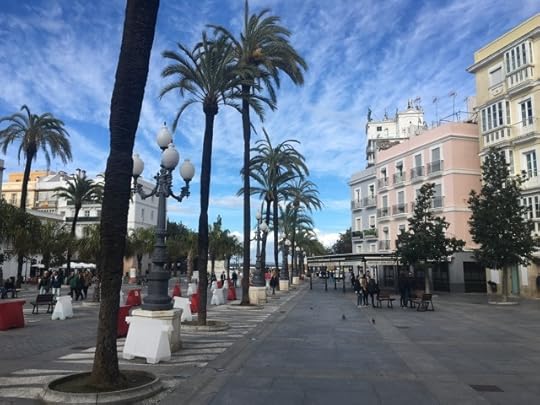
Billed as the oldest continuously inhabited city in Europe, the former island of Cadiz is less than five kilometers long. At its widest, it is not much more than a kilometer across. In the days of old, Cadiz really was an island, but now a causeway connects it to the mainland. It is also one of my new favorite cities, rocketing up the charts to mingle with the likes of Barcelona and Lisboa.
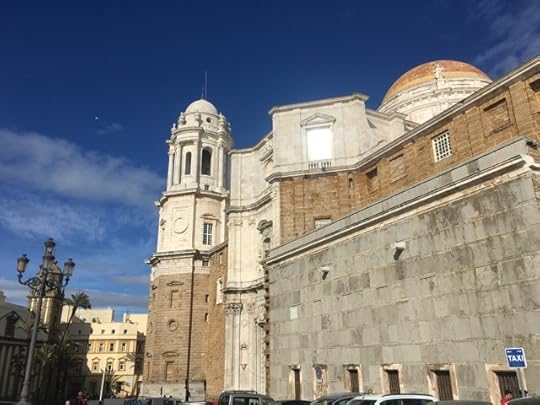
See the domes on the Cathedral? That's a sure sign this used to be a Mosque.
Oldest continuously inhabited city in Europe. Yeah, sure, blah-blah-blah. Sounds like another roadside attraction, right? So I thought as well, being the jaded sort of guy I am, but guess what? It turns out to be true! Cadiz (say it with me now: CAH-disss) was founded by the Phoenicians about 1100 BCE. That's Before the Current Era, as in a damn long time ago. It wasn't called Cadiz (hiss like a snake!!) back then, almost 3,120 years ago. The city has had a few different names as conquerors came and went. When it comes to historical name-dropping, Cadiz has a few cards up its sleeve.
We already mentioned the Phoenicians, one of the first advanced sea-faring people of the ancient Mediteranean world. Then came the rise of Carthage, a city-state and cousins to the Phoenicians. They were the power against which Rome fought the Punic Wars. Imagine a World War that lasted, on-and-off, for 120 years. That would give you a good idea of what the Punic Wars were like. During the first Punic War, Catharge occupied Cadiz. The Third Punic War began when Rome and Carthage exchanged in "Double-Dog-Dare-Yas!" The Romans got pretty miffed, burned the city of Carthage to the ground, then made sure that not a single stone stood atop another. Carthage disappears from history.
Back in Cadiz (CAH like a crow, Dsssss Hiss like a Snake!) it was the usual bloody history of the Roman Empire. Imagine a progression of Pax Romana, war, war, war, New Emporer! Pax Romana, war, war, war. Oops, we let the empire fail!! Maybe too many emporers. Aieeeee, here come the Visigoths (or Goths, or Huns, or...) And so it was here, Romans, Visigoths, Byzantines, Visigoths again, and finally the Moors. For all that is blathered about the Infidel invading Christendom, the Moors were a stunning example of stable government. Trade flourished, the arts and sciences flourished, and the Moors were surprisingly tolerant of other religions, including the Christians and the Jews. For about five-and-a-half centuries, there was peace and prosperity for most of the southern Iberian Peninsula. The Moors could be as bloody-minded as anyone else in the region, but they basically maintained a peace that lasted until the Christian armies pushed them south. The regular fun-and-games of feudal war began just after the arrival of the Christian Knights.
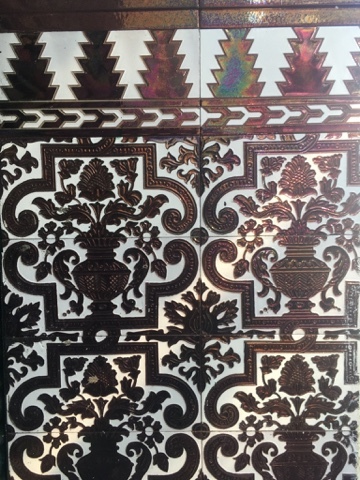
Gone but not forgotten, the stamp of Moorish culture is seen on almost every wall in Cadiz.
As far as name-dropping goes, the city has serious clout. Hannibal was here, as was Julius Caesar. Christopher Colombus sailed from Cadiz on his second and fourth voyages to the New World. Good old-fashioned pirating was a big tradition here. As the treasures of the West Indies flowed into the mouth of the Guadalquivir River, so did the Pirates. First it was the Pirates of the Barbary Coast, North Africans on the make for loot. Later on, it was British Privateers (a Privateer is a pirate with a license) who raided the city. In 1587, Sir Francis Drake, the most notorious mercenary of his day, looted and burned the city.
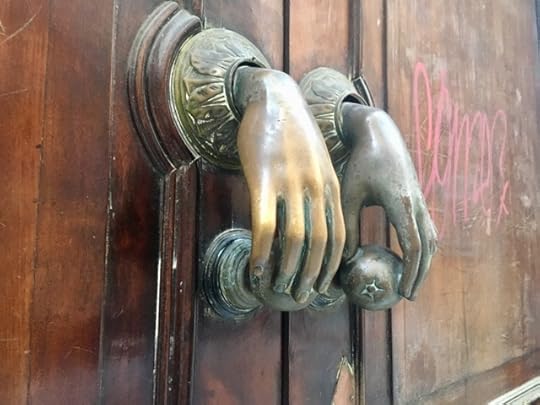
Don't worry, there won't be a pop-quiz at the end of the blog post. I do think it is important, however, to have at least a cursory understanding of the history my big, flat feet are stomping across. If you need another set of quick crib-notes, it would go something lke this: Christians kick out the Moors! Yay for Feudalism! Two centuries of nothing. Exploration! New World! Yay, Gold!! Shit, it's the Pirates! Dammit, it's the English! Take that, you Pig-Dogs! Crap, they sunk our Armada. That sucks! Crap, it's the English again, wait, now it's the French, stupid Napoleon. Argh, bastard pig-dog English again! And so on, and so on.
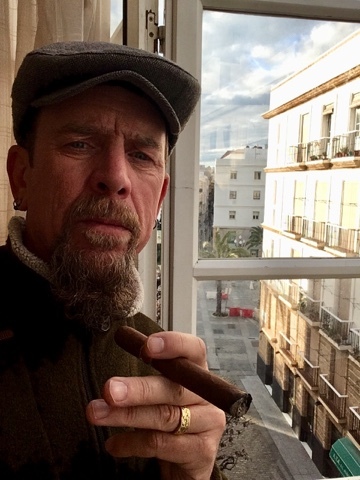
A Room With a View (and cigar)
Okay, enough with the history. My Beautiful Baby and I are in Cadiz, after a successful and easy travel day. We drop the bags, hit a cafe for a dose of caffiene, and set out for walkabout. One cannot get lost in Cadiz. There is water on three sides and a modern city on the fourth. If you hit water or new buildings, turn back.
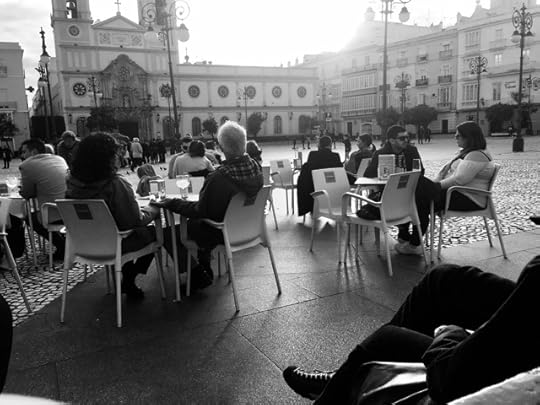
Cafe time on one of the many old plazas.
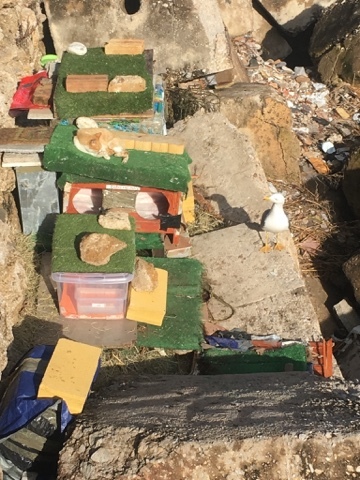
Stray Cat Hostal on the breakwater. Some local women take care of the cats, building little huts for them out of plastic bins and whatnot. The Hostal complex stretches a good bit along the breakwater. Interestingly, I saw the same thing in Navarre, Portugal. The smell was a mix of stray cats, old cat food, drying fish, and seagull. A powerful aroma.
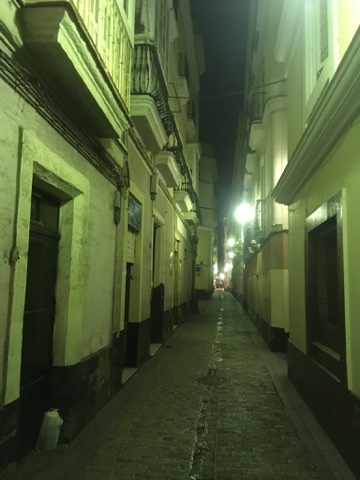
Night falls and the late Spanish dinner hour finally arrives.
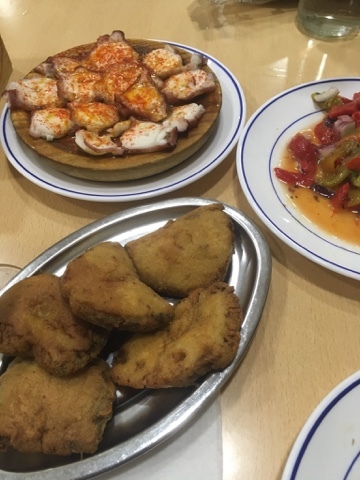
Tapas! What a surprise. Dogfish, pimento salad, octopus, and, of course, bacalao.
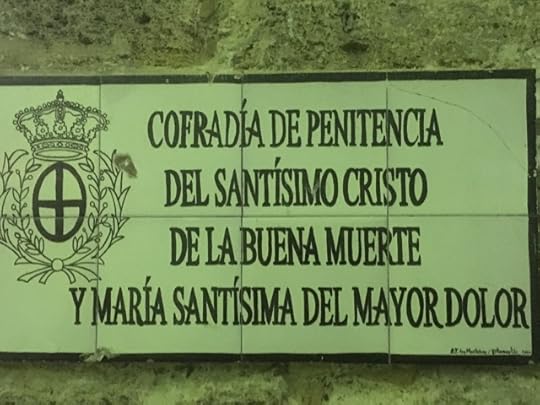
Along the narrow stone lanes of Cadiz are huge wooden doorways. Next to some of the doorways are tile plaques. Spanish is a bit like Entish, in that anything worth saying is worth taking a long time to say. This particular doorway was on of the many organizations preparing for the upcoming Semana Santos, or Holy Week. This would be something along the lines of: "Sisterhood of Penitents of the Holy Jesus of the Blessed Death and Mary, Saint of Great Suffering."
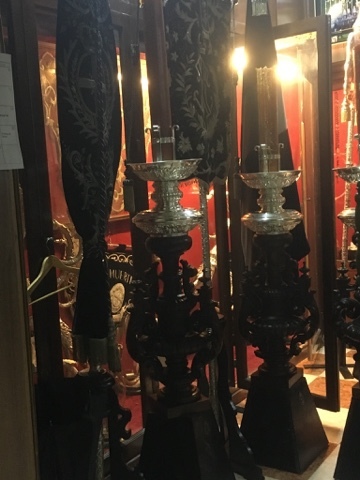
I snuck a peek in the doorway, just to see what goes on. A whole passel of pious folk were busy polishing and cleaning the oversized candle holders that will be part of the Semana Santos processions.
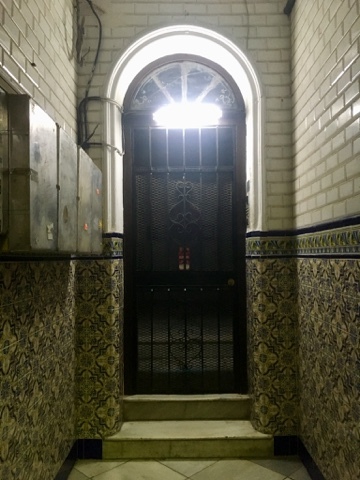
And sure, Cadiz is also a good town for doors. All of these ancient cities feed my obsession with doorways. Okay, I admit it, I have a bit of a problem. Maybe there is some cool new-aged therapy for door obsession.
As Tio Roberto would say: Ta-Daaa! I moved the blog ahead to Cadiz, one of my new favorite cities. I dropped in as much history as I dared. (Yeah, yeah, the city is old. We get it.) It is late, the travelers are tired, time to say goodnight. Sleep well, sweet dreams, watch out for the Pirates, and Ciao for Now!
Published on March 22, 2018 04:04
March 21, 2018
Adios Gnomos

While the new day did not blaze into summer, the frigid hurricane had at least passed. The flowers were blooming at La Hacienda de Los Dos Gnomos. The lemon and orange trees had survived, and the bees were happily buzzing around the bay tree. Some semblance of spring had returned. We kicked off the piles of blankets, squeezed oranges into juice fit for the Gods, and brewed up the French press. There would be an afternoon train bearing us south, but the morning was ours.
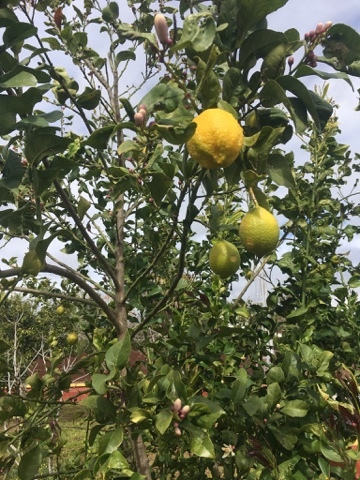
"Lemon tree, very pretty..."

The single Bay Tree, bearing enough bay leaf to make ten thousand stews.
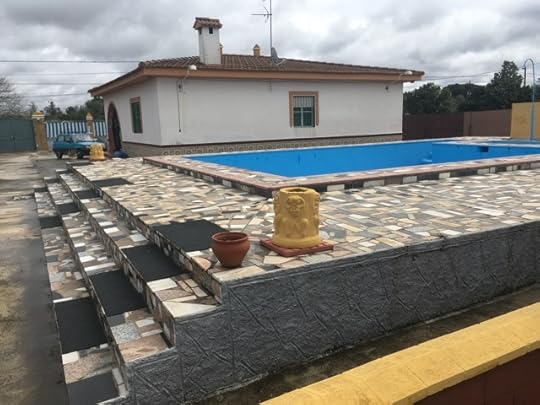
Not exactly blazing heat, nor a day for swimming, but the clouds were breaking. We were off for a hike in a nature park not far north of Isla Menor. Wearing only half of the warm clothes we had packed, we piled into the little turquoise Marbella and rattled down the pot-holed roads of the neighborhood. Dogs barked and roosters crowed, the normal din of the morning. Tom describes Isla Menor as "half suburb, half Rez." It is a strange place, a cluster of closely packed houses ranging from fine homes to tumbling shacks. Each property is walled or fenced, most surrounded by heavily-laden fruit trees, and each property sporting at least one dog. The narrow lanes between the walls are unpaved, riddled with bumps and potholes. Isla Menor lies some seven kilometers from the edge of the town of Dos Hermanas. It is surrounded by fields and groves of olives and oranges. There isn't any really good reason for the place to exist, yet it does.
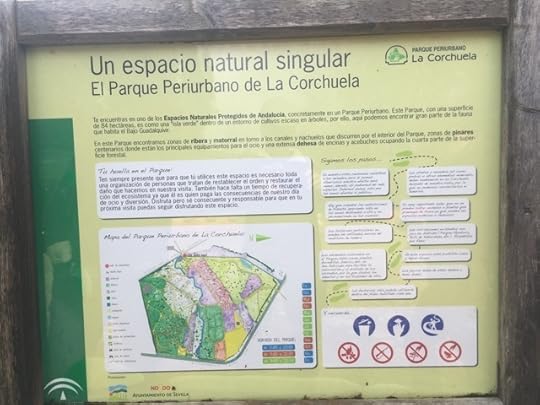
Our destination for the morning.
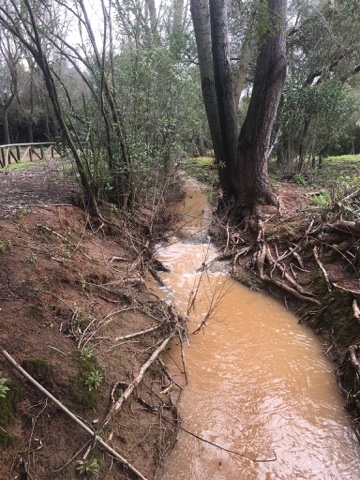
We skirted rain flooded streams, sodden paths, and boggy meadows. It was glorious to be outside, unmolested by the hurricane of the previous day. The lack of rain was the only excuse we needed for a good walk. Walk we did, and talk, and laugh. We threaded our way under strange round-topped pine trees that resembled giant mushrooms. There were groves of wild olive to explore, the damp forest floor littered with olives the size of rabbit droppings. We searched for hares amongst the tussocks. It was a fine morning and well-spent.
Back at the hacienda, we had time for one more meal, one more coffee, and one more conversation. Promises were made of trips to the north, and return trips to the south. It is a fine thing to have such a good old friend on this side of the pond. I very much look forward to out next reunion.
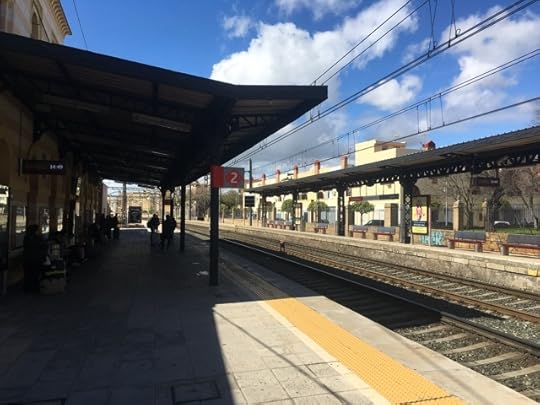
Blue skies for departure.
The time came for us to board the train. Tom left us at the station and we walked to our platform. Our destination was Cadiz, one-and-a-half hours to the south. The train arrived on the dot, a far cry from my memories of Spanish trains in the long-ago. The last time I was in Spain, Franco had only been dead a few years. The Spainards were giddy with possibility after the long night of Franco's dictatorship. One thing that they had not figured out, however, was a timely train. Things have changed a lot in forty years. Damn, I am getting old!
We rolled across the Spanish countryside, all open fields and rolling hills. Huge wind turbines spun on the hilltops. As we passed Jerez, I tried to spot the famed MotoGP track, but it was nowhere to be seen. We dropped into the marshy delta of the Guadalquivir river, a maze of estuaries and backwaters. We crossed the long causeway to Cadiz, the Atlantic Ocean to our left, and the sweeping bay to our right.
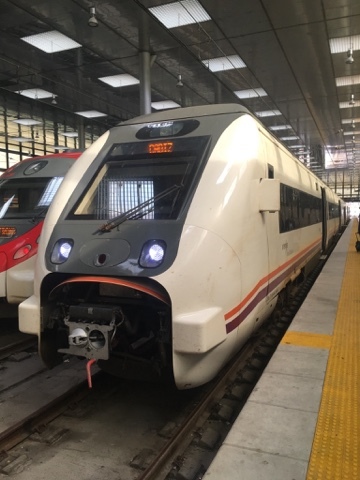
Train Station, Cadiz, Spain
We disembarked our train and shouldered our backpacks. It was but a short walk to our hotel in the old city, and Cadiz is very, very old. It is also not pronounced the way you are reading it. To say it like a good Andalusian, it is "CAH-dissss." You really have to lisp that "Sss" to make it work. The ancient city of Cadiz, however, is going to have to wait. The wifi I am using is very sketchy, with barely enough bandwidth to pull down an email, much less upload a long post. So for now I will say Adios. And in good Andalusian, that is Ahhh-Dee-O. Forget the "Sss" altogether. Don't worry, you get used to it.
Travel well, travel often, and from Cadiz, it's Ciao for Now!
Published on March 21, 2018 11:29
My Fair Ladies
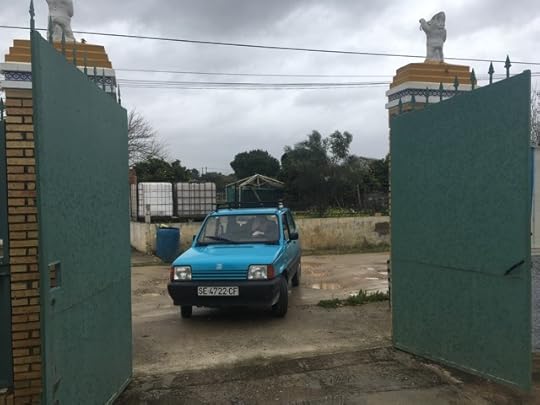
La Hacienda de las dos Gnomos
The Hacienda fell under the curse of Rex Harrison and Audrey Hepburn. Verily, the Rain in Spain Fell Mainly On The Plain. My Fair Ladies, Dos Hermanas, the Two Sisters, were some seriously soggy Spanish wenches. The rain doused our plain, the fields of olives and oranges that surround Dos Hermanas. Rain, rain, and more rain. Not only was it raining, it was damn cold as well. The house took on the chill as only a completely concrete and tile structure can. But did we cower? No, we did not. Okay, maybe we cowered a bit, but eventually we got bored with cowering and decided to try our luck. But our luck wasn't having any of it.
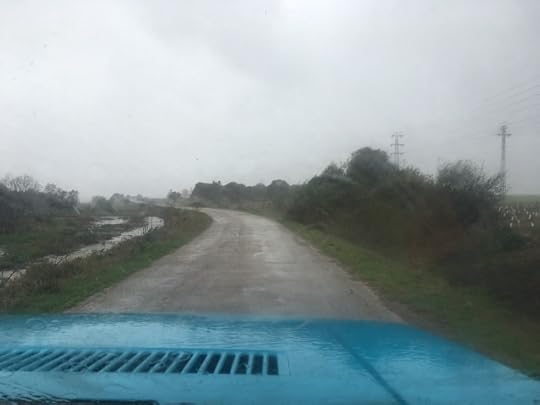
The lovely view of Southern Spain on a spring day
We loaded up the Marbella and headed out into the squall. To the south of Isla Menor is an African Stork refuge. The storks build enormous nests on the top of power pylons. Local bird aficionados have convinced the power grid folks that the birds aren't hurting anything, so a relationship of tolerance has developed. Despite the raging wind trying to push little Marbella off the narrow lane, we blazed and rattled across the rain-drenched plain. Stupid plain. All the while, Marbella's tinny alarm screeched at us, as if to say "Turn Back, you Fools! Turn Back!"
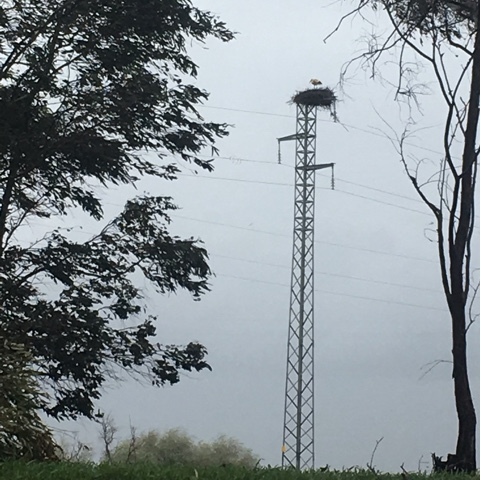
An African Stork and its giant nest
We did find the storks. We did see their giant nests, and the storks themselves. We even saw the heads of young storks peering over the precipitous edge. We did not, however, venture out in to the gale. The screechy interior of Marbella was fine with us. We retreated to La Hacienda and huddled around the heaters. We smoked, we made horrible jokes about Rex Harrison and Audrey Hepburn, invented ribald scenarios that would have given that old movie an X-rating. We made the best of it.
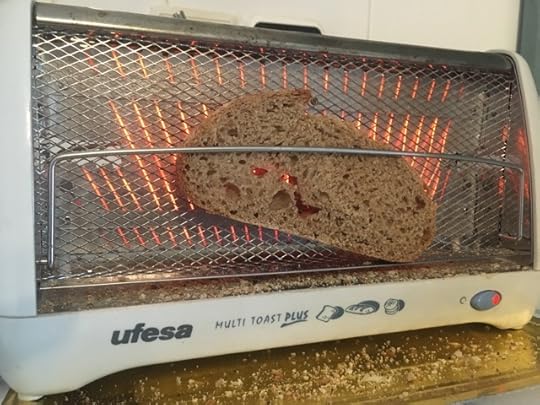
Making toast Spanish Style
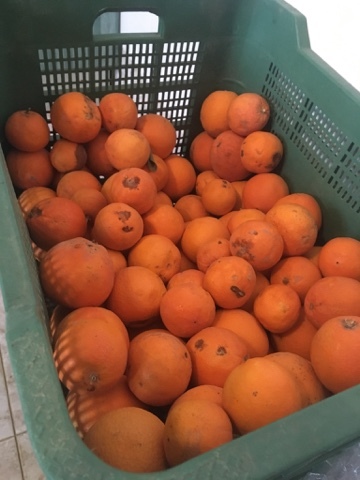
If one is trapped in a cold house on the plains of Spain, one must do what one can. The orange crop was waiting for attention. This is just one crate of oranges. There is another crate nestled below this one. None of these oranges were purchased. This is but a part of the harvest from the orange grove on the Hacienda. More oranges than you can shake a Spanish stick at. Even after canning up a massive batch of orange marmalade, there are still crates of oranges lying about. Besides the oranges, there is a crate of lemons. What's a rain-bound traveler to do?

Make juice! Lots of juice!
We whiled away the day in good company. As the evening came on, we decided to brave the squall and head into Dos Hermanas. There was some hope of catching one of the Semana Santos events. I have to admit that we were roundly defeated. Wind-swept rain pummeled the narrow streets of the old town. We saw sodden Spaniards clutching horns and drums, scattering before the storm. We soldiered on until we were soaked. Giving up our folly, we headed for the supermercado to stock up on supplies. Tonight it would be dinner at home, with yours truly as chief cook. Damn you to hell, Rex Harrison!
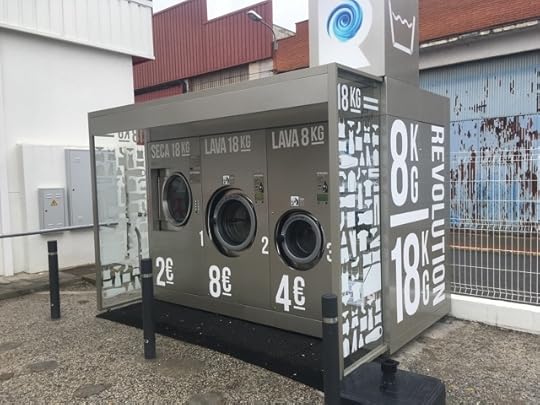
Outdoor clothes dryers in front of the supermercado. I thought about chucking myself inside and feeding the machines coins. At least I would be warm and dry.

Cheap olives, one of the benefits of living on this soggy plain. This is also a shout-out to my Ecuadorian Ex-pat Hermano Mark Hansen. No man loves olives more than he.
In the end, we persevered, but we persevered by staying inside. The weather forecast gave a promise of sunny weather on the morrow. For this night, however, the squalls pummeled the hacienda. At least we were not stuck in a hotel somewhere. Better to be trapped in the house of a good friend, with fine company and ample orange juice and toast. We shared a fine meal, laughed and joked. Eventually it was off to our beds, snuggled under piles of blankets, listening to the howl of the wind and the splatter of the rain.
"By George I think she's got it!" I doubt either Rex Harrison or Audrey Hepburn actually endured the Rains on the Plains of Spain. If they had, they would not have been crowing about it in silly songs. But to hell with them, here we were, and here we would stay. Tomorrow was a day to travel, a day of promised sun, a day of parting. But for now, it was time to sleep. Which means, of course, that it is time for me to say "Ciao for Now!"
Published on March 21, 2018 05:16
March 19, 2018
Adios Sevilla
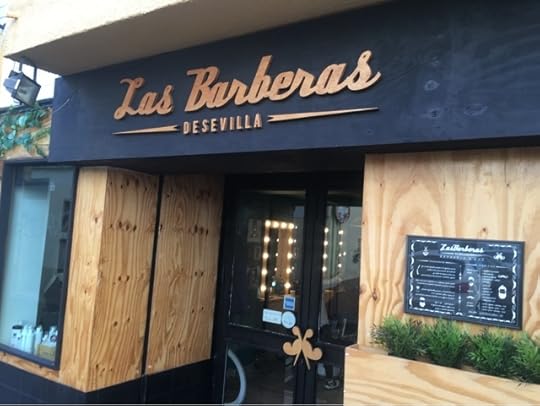
Yes, there really is a Barber of Seville. Or Barbers, in this case.
It was a travel day, a day for bidding adios to Sevilla. This historic city now ranks amongst my favorite walking cities. It is a place to stroll, to get lost, to find a new way. It is a marvelous place for a foodie, a nosh here, a coffee there, and then assorted little plates for dinner.
Our destination for today was a small enclave on the campo outside of the town of Dos Hermanas, the Two Sisters. We had a rendezvous, 11 AM in front of the bullring. How's that for a romantic pickup point? Our host was a friend of mine recently moved to Spain, an old friend of almost two decades. We had not seen each other in several years and now we would meet in Sevilla. The day was full of promise. But before we would meet, there was one more walkabout.
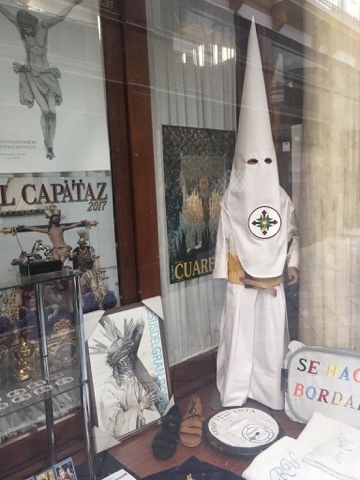
"No one expects the Spanish Inquisition"
The good Spaniards are preparing for Semana Santos, or Holy Week. The week before Easter will see processions of holy relics and statues carried through the streets. Small armies of the pious, dressed in capriote gowns complete with pointy hats, will take to the streets. They will shoulder the huge platforms bearing the local Madonna or Saint. The icons will be carried to the most important church in the town, there to be displayed and blessed. The capriote were originally worn by the unhappy folks arrested during the Spanish Inquisition. The hoods and gowns were later adapted as the dress of flagellants, those who flogged themselves in an act of penance. Today these historic garments are the costume of those who bear the holy statues through the streets to be blessed.
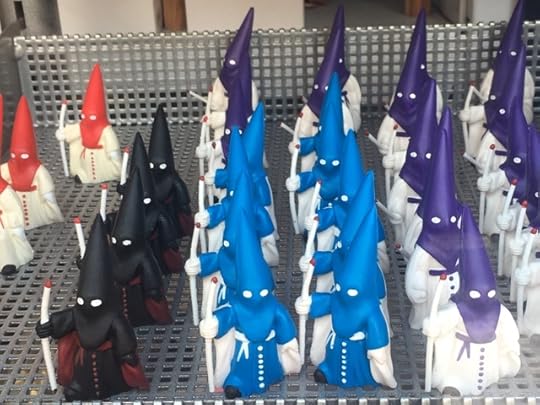
There are even Lego-sized capriote figures for the kiddies.
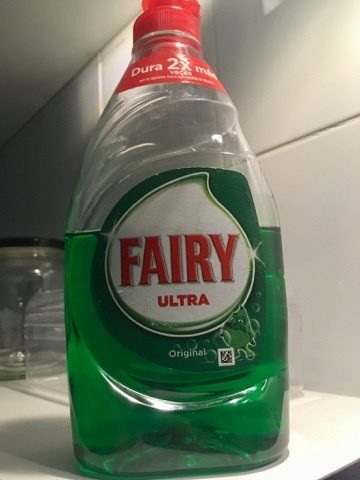
Holy Week is yet to come, and we had our own penance to do at the courtyard apartment. When the dishes have to be done, and when regular fairy just isn't strong enough, reach for Ultra Fairy!
Cleaned and packed, we bid adios to our wonderful courtyard. It was a twenty-minute walk through the old city, quite enough with full backpacks. But the sun was shining and the birds were singing.
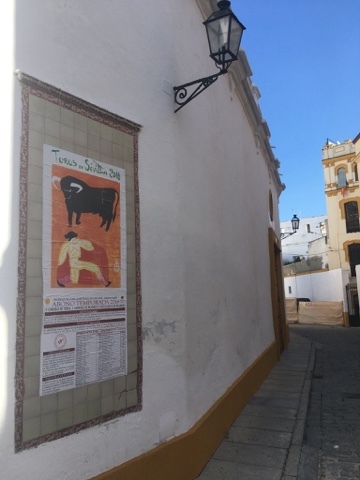
Bullring, Sevilla
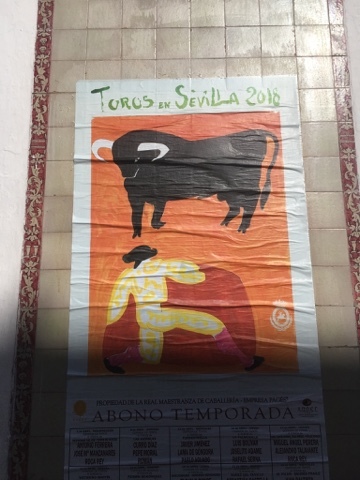
Light and shadow, we threaded our way around the bullring. Many a fine Toro has met his demise here, suffering the final sword-thrust under the hand of the Matador and the Oles! Of the crowd. The blood sport continues, love it or hate it.
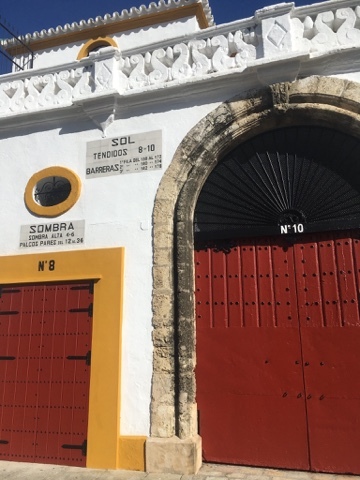
The Bulls go in, but they do not come out, at least not drawing the breath of life.
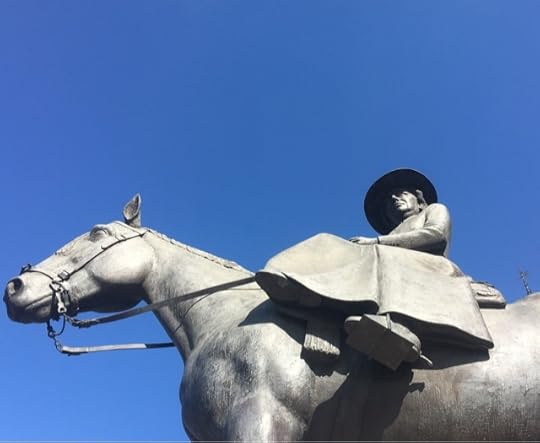
The stern countenance of yet another bronze figure, basking in the bright Sevilla sunshine.
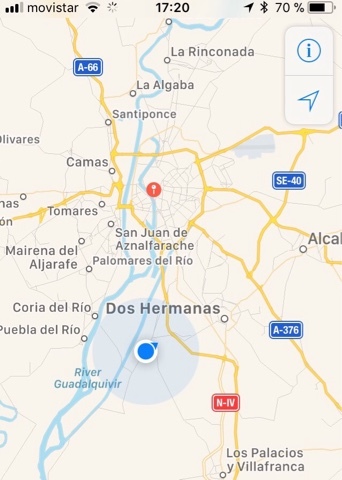
We waited in front of the bullring until a tiny turquoise car appeared, piloted by my friend Tom. Hugs of greeting, laughing at the Spanish version of a bad Fiat, the little Marbella, our chariot. Piling into the diminutive vehicle, we rattled into Sevilla traffic. An intermittent alarm squealed from the dash, piercing the squeaks and rattles of little Marbella. "Not to worry," says Tom, "It does that." Who am I to question? First stop, a Spanish Moto dealer. Tom and I have a shared love of all things two-wheeled, including years of Moto racing. My beautiful wife indulged us while we kicked tires and looked at Moto gear. Back on the road again, we hit the motorway south, heading out into the campo.
Tom is now a man of property, a Haciendado. He and his lovely Czech wife are the proud owners of a small house in the Isla Menor, a strange enclave outside of the town of Dos Hermanas. I have dubbed the place La Hacienda de las Dos Gnomos. The Ranch of the Two Dwarves.
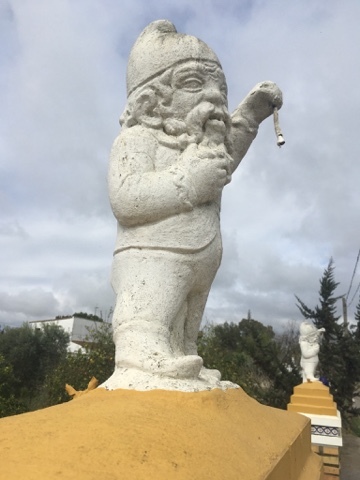
The namesakes of the Hacienda guard the entrance.
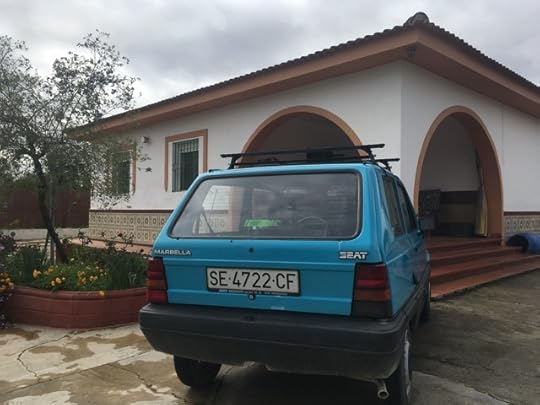
Marbella and the house in the Campo.
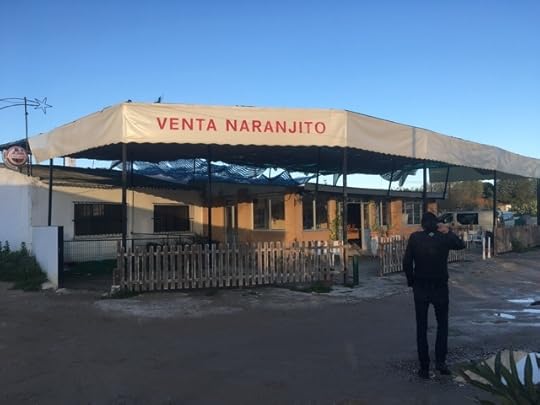
The heart of social life in Isla Menor, the Venta Naranjito. The Little Orange.
The afternoon was spent lounging around, smoking on the veranda, and catching up on old times. It was good to sit with an old friend, good to laugh about a rendezvous in the far south of Spain. "Who would have thought?" That was our refrain. The strange twists and turns of intertwined lives had brought us to this tiled patio, thousands of miles and an ocean away from our old homes.
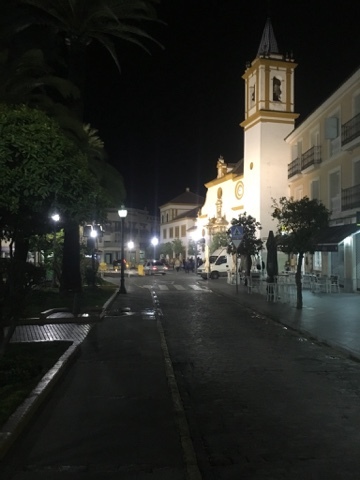
Dos Hermanas
Night falls, and thoughts turn to food. In Spain, thoughts turn to food late in the evening. The dining hours of the Spanish take some getting used to. Between the hours of about two PM until four PM, most everything shuts up tight. Around six PM, the bars open up, but the kitchens are closed. It is time to drink and talk, time to work up an appetite. The evening meal can't possibly be consumed before eight PM, with many places staying open until midnight. To venture out for dinner at sixish is to be both hungry and disappointed.
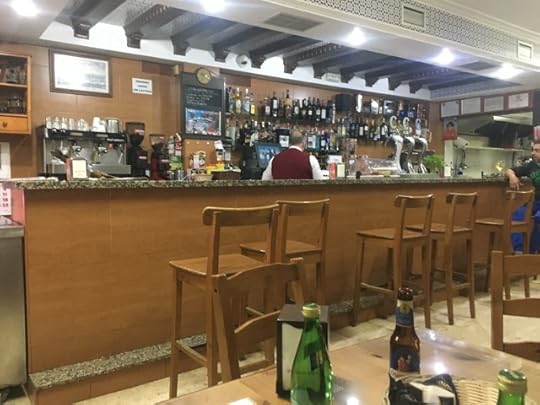
Eight-thirty PM and just warming up for another evening of tapas. Even at this late hour, we were the early birds.
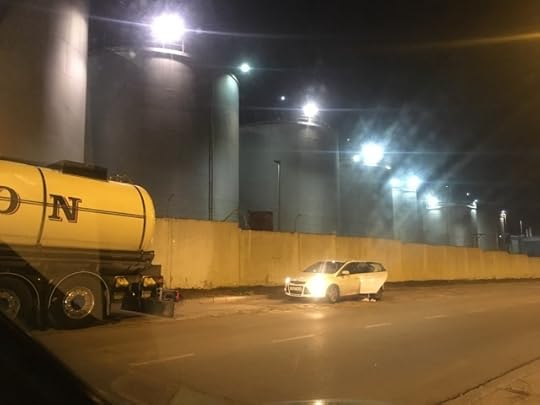
It is an oil refinery, that is true. But this is Olive Oil, the life blood of this region.
Olives and oranges, oranges and olives. That is what this area is all about. The huge storage tanks we passed on the way home were filled with olive oil, bound for export around the world. Folks in these parts are proud of their olives, and rightly so.
The chill of an unseasonably cold spring settled over La Hacienda de las dos Gnomos. We huddled around the few heaters, trying to ward off the chill. Rain squalls swept in, adding damp to the cold. Many houses here do not have heating because it is not widely needed, but this year is an exception. Tom's Spanish neighbors were bitching long and hard about the cold and rain. We would see a good bit more of it on the morrow, but for now we burrowed into our blankets and let sleep wash over us.
From Isla Menor, Spain, it is time to say Ciao for Now!
Published on March 19, 2018 10:20
March 17, 2018
Sevilla Walkabout
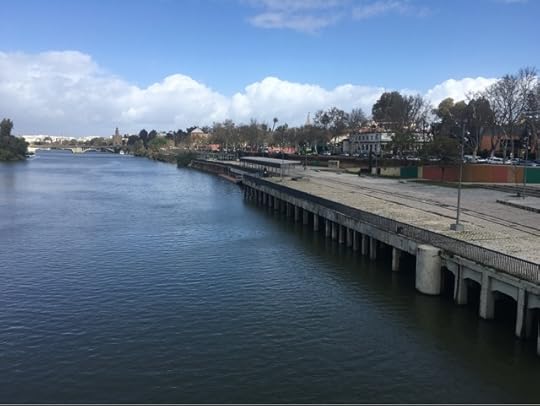
The Guadalquivir River, Sevilla's lifeline to the Atlantic
Sevilla, Spain. The Barber of Seville. This ancient city is the fourth largest in Spain, set in the far south. Built on the banks of the Guadalquivir River, the riches of Spanish conquests in the New World flooded into this city of the Old World. At one time it was one of the most important trading cities in all of Europe.
The city was founded by the Tartessians in pre-Roman times. The Romans conquered the city and it became a provincial town of the Roman Empire. After the fall of the Roman Empire, the city felt the sandaled feet of 'barbarian' invaders, the Visigoths and others. Then came the Muslim conquest of 712, when southern Spain came under Moorish rule. The imprint of Moorish art is still stamped across the tiles of the city. Five centuries of Moorish rule came to an end when the Castillians re-conquered the southern Spanish peninsula.
As the Spanish conquered the New World, they sent their plundered riches back to Spain. The official port of entry was Sevilla. For most of the sixteenth century, all of the gold and silver from the Spanish West Indies traveled across the Atlantic Ocean, then eighty kilometers up the river to Sevilla.
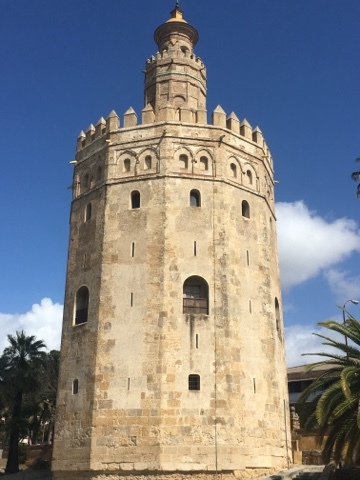
The Tower of Gold
Plundered loot poured into Sevilla, off-loaded from Spanish ships. Sevilla had the Royal monopoly on all goods. Any traders wishing to purchase trade goods from the West Indies had to come to Sevilla to make the buy. Money literally poured into the city. This lasted for a century, until the river began to silt up. When shipping became more difficult, the Spanish Crown lifted the monopoly and opened the port of Cadiz. Sevilla remained an important city, but no longer had the stranglehold on all trade from the Indies.
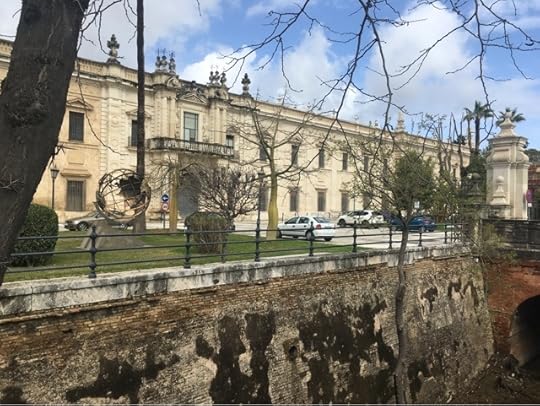
The Real Fabrica de Tabacos
Sevilla was home to one of the first tobacco processing warehouses in Europe. The Fabrica was established in 1728. At the time, it was one of the largest free-standing buildings in the world. The building is still there, surrounded by its moat. Is is now part of the UIniveristy of Sevilla.
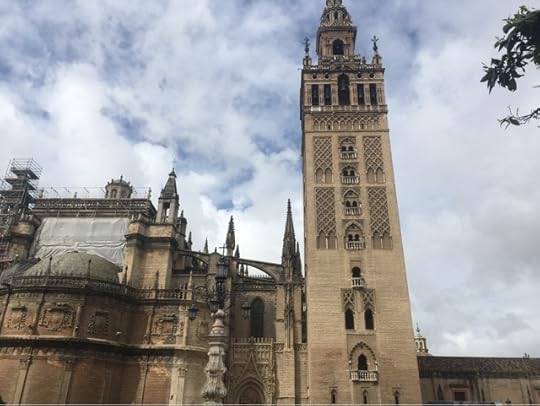
With the riches from the New World came riches for the city. The Sevilla Cathedral is on of the largest in Europe. Originally a mosque, the cathedral still retains Moorish influences. Hidden under the flying buttresses and towers are the domes of the former mosque.
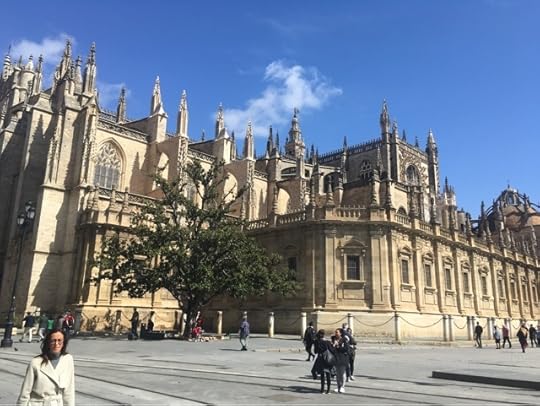
If you like giant piles of stone, you have come to the right city. One cannot throw a Belgian paving stone without hitting a church, big or small. While there are enough monuments to keep a dedicated enthusiast busy for days, Sevilla has a great many other charms. As a walking city, Sevilla rivals Lisboa. Tiny, twisting passageways form a labyrinth that defies maps or sense of direction. It is a delightful town for simply getting lost.
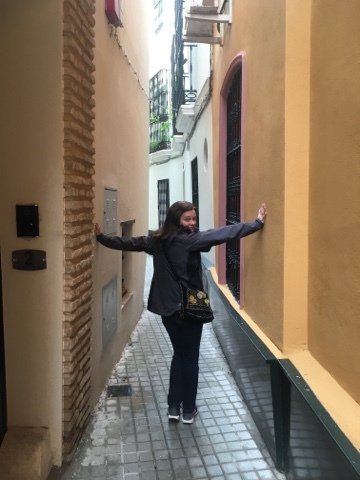
Wandering the maze of Sevilla is what I will remember most fondly. In the old city, nothing runs in a straight line. A large part of the El Centro is restricted to delivery vehicles, taxis, and residents. We watched small delivery trucks squeezing through impossibly small lanes, places so narrow that the side mirrors have to be folded in to allow clearance. And those are the big streets.
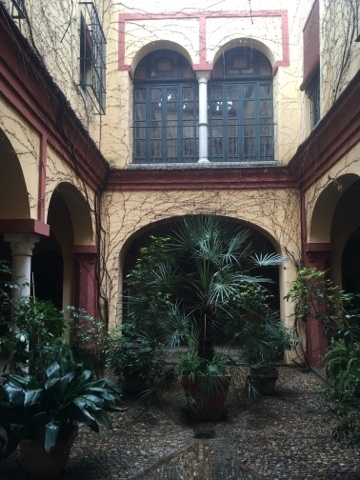
HIdden courtyards offer a glimpse into the private life of old Sevilla.
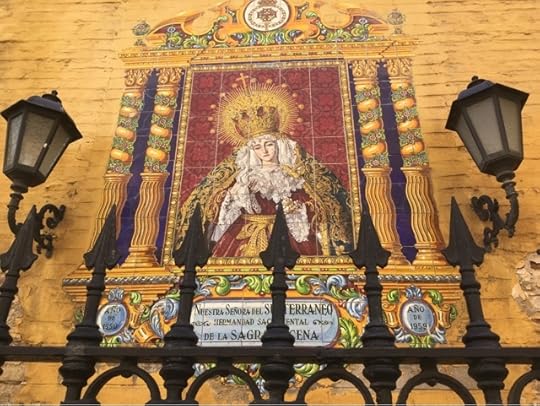
Sad-eyed saints and virgins look down from every other wall.
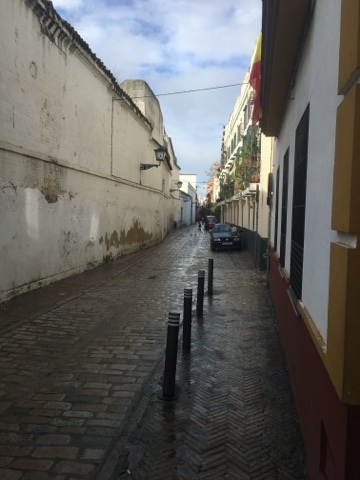
A Main Street in the Old City
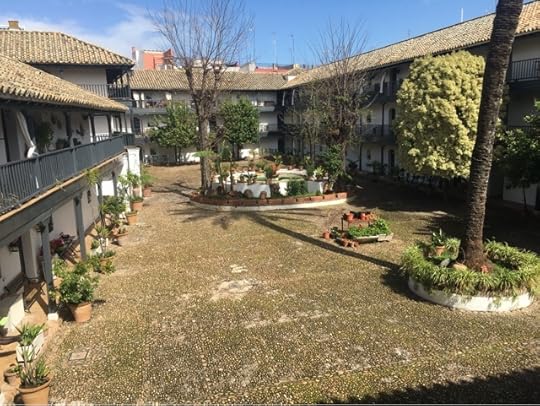
(Yes, I know I used this picture in the previous post)
Picture this courtyard in the 1600's, when this building was home to around seventy families. There was no indoor plumbing. Entire families cooked, did their laundry, and lived their lives in this courtyard. Bathing, when it was done, was accomplished in the public baths that were part of this enclave. Then the Plague came to Sevilla. In 1649, the Plague raged through the city. The population was reduced by half as people fled or died. Most died.
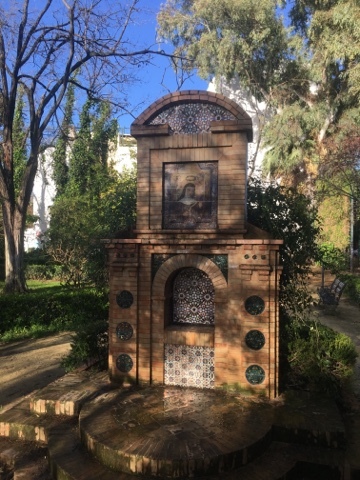
Quiet refuge in the old city
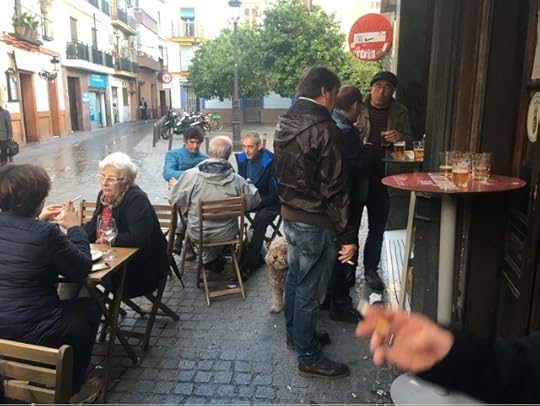
At six o'clock, it is time for walkabout to end and relaxing to begin. Find a bar and cozy up with the local folks. No good citizen of Sevilla would think about eating dinner before eight. The time between getting off work and dinner is spent in the company of friends and neighbors, preferably at a local bar. Libations are cheap here, and folks are friendly. Two damn-fine coffees set us back 2.40 Euro.
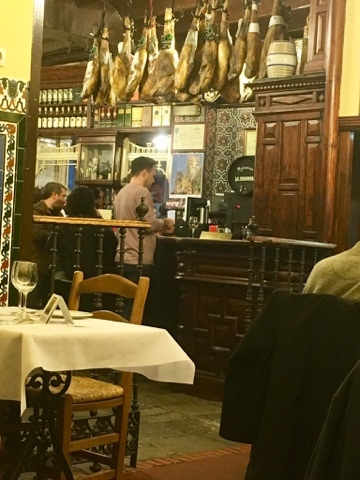
Tapas in the bar out front, under the air-cured hams. Restaurant in the back for full meals.
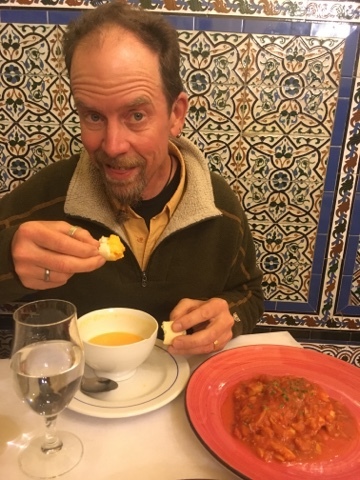
Gazpacho laced with lots of cilantro and a plate of Bacalao en Tomate. Bacalao is dried cod, one of the traditional staples of the Spanish and Portuguese coastal regions. It is cooked in a multitude of ways, from croquettes to stews. The saying is that one can eat bacalao 365 days a year and never eat it the same way twice.
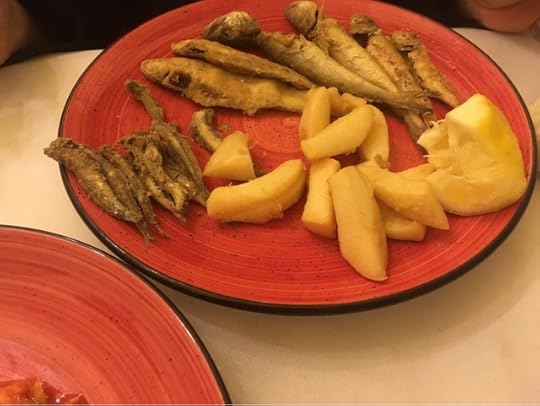
Fried fishes and more fried fishes. Even the bits that look like potatoes are fishy. That is actually fried chunks of squid.
Time for weary travelers to return to the Corral de Conde and a nice warm bed. Dinners run late in Sevilla. It has been another great day of walkabout in another great city. I am one very lucky traveler. Today we dodged the rain, walked our feet to stone, and now rest weary in our snug little sixteenth century monastic cell. Tomorrow is another day, a day of meeting friends and journeying south. For this evening, travel well, travel often, and Ciao for Now!
Published on March 17, 2018 08:49
March 16, 2018
On the Plane Again
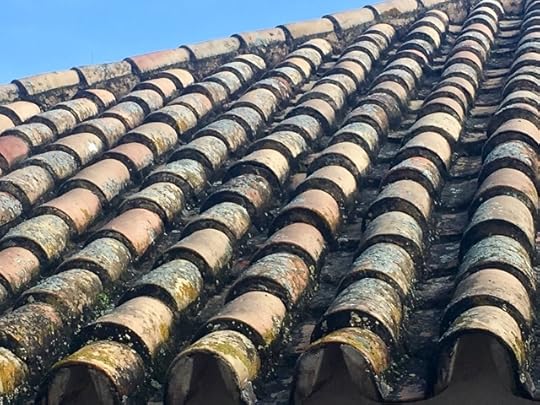
It was up early, onto the Ubahn, then the Schnellbahn, to arrive at the Wien airport. I am just a few days healed up from the return from Ecuador. The microbes have been vanquished, and it is back on the plane again. This trip I am in the company of my beautiful wife. We are bound for Sevilla, Spain. So it is Vienna to Zurich, Zurich to Sevilla. It is a bumpy little turbo-prop to Zurich, a ride that My One is less than thrilled with. Sitting on the bigger Airbus in Zurich, we can see our backpacks make the journey up the ramp into the belly of the plane. Yay, our luggage is going with us!
Sevilla Airport is like a time-warp, a leap away from stretched stainless and glass awning terminal, back to a time of squared off concrete and lots of it. We take the city bus into town, minding the GPS for a likely jumping off point. I miss it by one stop, but we end up a reasonable walk from our destination in the old city. Our digs for the next few days will be the Corral de Conde, which has a courtyard so famous that it is on the historic map of the old city. After a longish wait for someone to check us in, we are ensconced in our little studio apartment with a balcony to die for.
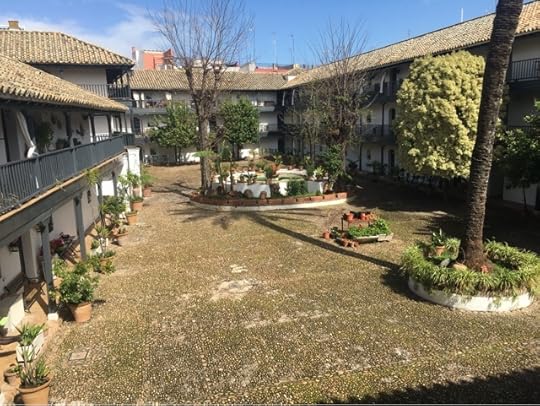
Dating from the Sixteenth Century, this is our base of operations for the next few days.
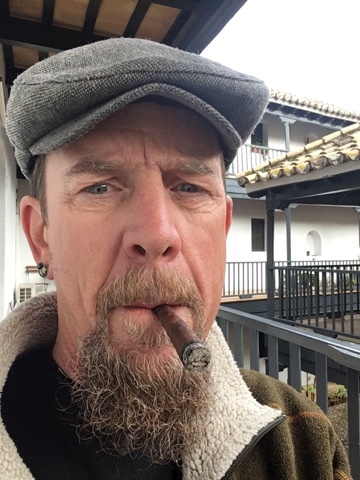
A well-deserved break on the balcony as the clouds roll in.
The rain in Spain falls mainly on the plain. And it did. Not being fair-weather travelers, and hungry to boot, we ventured out at the early Spanish dinner hour of 7:30 PM.
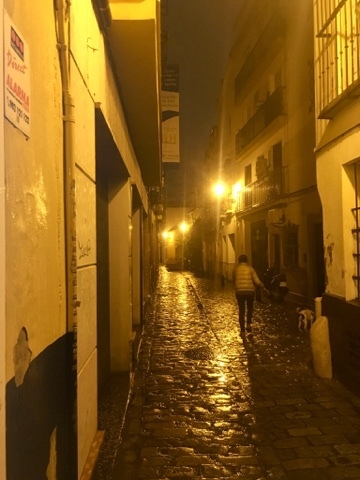
Tapas! Bring me the tapas and no one has to get hurt!!
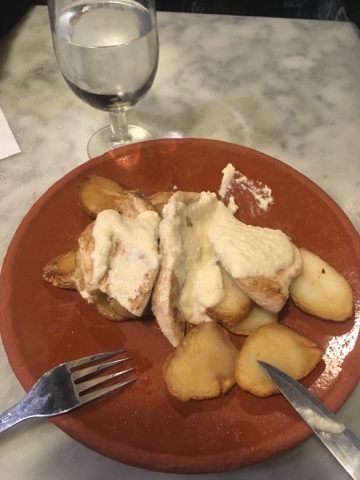
Pollo y papas in almond sauce, one of the many small plates that crossed our table. Tapas for two, drinks and tip, the total bill came to 18 Euro. Not bad for a destination European city. There was a bit more wandering, a bit more rain, and then settling in for the remainder of the night.
There is a lot more to say about Sevilla, but it will be said later. It was a good travel day, a bit on the dampish side, but we are here. Tomorrow is another day, a day of walkabout and noshing, but that will have to wait.
From Sevilla, Spain, it's Adios! And Ciao for Now!
Published on March 16, 2018 10:30
March 12, 2018
The Relative Weave

Things come unglued. Where I began is not where I am, is not where I will be. No, that's not right. Let me start again.
I come unglued. I am unstuck from where I was, not fixed where I am, am not where I will be. Yes, that's better. I am somewhere over the Atlantic Ocean, and it is very dark. I am somewhat delusional. There are several factors contributing to my delusional state. First, I am sleep deprived. I have no reference for what time it is. No, that's not right. It is more correct to say that I have no reference for where I fit into time. Second, an army of microbes has taken up residence in my gut, though I don't know this yet. Not at this point in time, this weave, this warp, this moment overlapping all the other moments. Third, my left eye has become host to a colony of viruses. This I am aware of, though I am trying to deny it, trying to force myself back to a time when the viruses lived somewhere else. It is not working. Since I have nothing but time, I begin to muse on the nature of time. I am alone at night on a plane over the mid-Atlantic. Musing on the nature of time, at such a time, is a mistake.

Time can get weird. For everyday life, we humans use time as a measuring device, a metronome that remains constant. Tick-tock, tick-tock. The old joke tells us that time is how humans keep everything from happening at once. Funny. Einstein would have laughed his brainy-butt off at that one. The trouble is, time ain't. Constant that is. Two observers of the same phenomena, each moving at different velocities relative to the observed phenomena, will see different things. Both observers will be correct in their observations. You do not have to believe me. I am delusional, remember? But you can believe Einstein.
I am over the mid-Atlantic, in the dark, feverish and deluded. On the tiny screen in front of me a movie is playing. I am not watching it. Not really. I am casting my addled brain back and forth over the weave and warp of recent time. Here is another wrinkle, another bit of mental yarn for my brain-paw to play with. I know, without a doubt, that there is more to the relativity of time than Einstein's brilliant theory. There is also the human brain's ability to alter perception of time. I know this because I have experienced it.
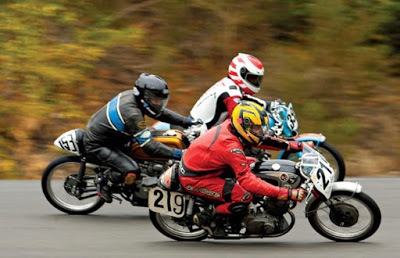
I am on the racetrack at Pacific Raceways. I am coming down the straight at full chat, tucked tight. Coming into Turn Two, my favorite turn, I lean left, dropping down smoothly, left knee just starting to skim the asphalt. All is well, this is my line, the bike is good, I am good, here we go. What I do not know is that a very light sprinkle of rain passed over this end of the track since the last lap. The tiniest sprinkle, just a dab of moisture. Just enough water to reduce the friction component by a few percentage points. Just enough to prevent going through the turn at full race velocity. Quite suddenly I am without my little motorcycle. I am sliding across the vast expanse of Turn Two, heading for the gravel run-out. This is when it happens. Time goes all wonky. It slows way, way down.
I am sliding on my back in a full-leather racing suit. My thoughts are crystal-clear. Where is the bike? Ah, good, I am clear of if. That would hurt; it sucks to get hit by the bike. Hmm, my left ass-cheek seems to be getting warm from the friction against the asphalt. I should roll a tiny bit right, but not too much. I don't want to start a tumble. That's better. Look, here comes the gravel. Remember not to stand up until we are at a complete stop. Feet first, here we go, into the gravel. Hey, there is the corner worker running over, waving his flag. Right, we must have stopped moving because the corner guy is standing next to us. Time to stand up and go find the bike.
I have seen real-time video of my low-side crash. The racer behind me had a Go-Pro camera mounted on his helmet. In the video, I shoot out of the frame like a leather-clad clown fired from a circus cannon. Zing! I am a blur flashing across the pavement like a comet. And yet, some part of my brain slowed the events down to a manageable pace, a calm, processable progression. A fluke you say, a trick of memory. But wait, there is more.
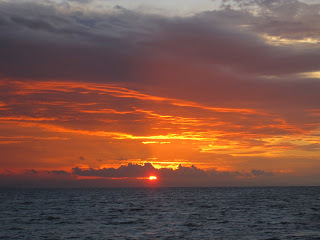
I am suspended in thin air. No, I am not on a plane anymore. Above me is a narrow steel aqueduct. Below me is more thin air, about two hundred feet of it, the void of a canyon, which the aqueduct spans. I have just fallen from the aqueduct. I can see my mountain bike on the edge of the steel structure, caught on the wire that threw me off balance and into the thin air that I am now suspended in. I know that the rock floor of the canyon is below me, even though I cannot see it. And I know that I am going to die. Time, that elusive construct that we are mulling over, has stopped. There is only the sky, blue and wonderful. Behind the aqueduct, the sharp relief of the Sierras rise into the blue. Seeming to come from all around me, there is a voice. The voice has a deep resonance, a calm, firm tone. And the voice says "This is it." Then a funny thing happens. Time speeds up. A lot. Things happen very, very fast. The aqueduct rushes away, followed by an all-encompassing flash of white light. The blast of light is accompanied by a cracking sound, which is me hitting a rock ledge. The rock ledge juts out into the void like the hand of providence. Granite, coarse grained, infused with lines of quartz, it is the most amazing scarp of rock on the planet. A bit later on, when the view of that most beautiful sky comes back, everything hurts. A lot. Funny thing, time. Ha Ha Ha.
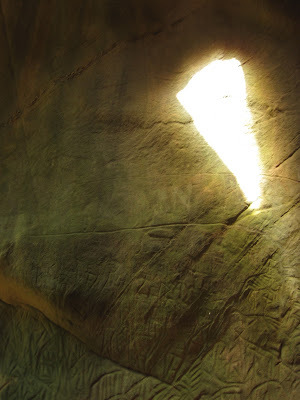
I am standing on a concrete landing at the bottom of a set of wooden stairs. The stairs lead upwards to the front door of a cute, blue bungalow. This is where I lived until today. The front door is open. Standing in the front door is my soon-to-be ex-wife. Just in front of the top step are a collection of brown PCC grocery bags, bags that contain my belongings. These random belongings have been hastily thrown into the paper bags. Paper bags make crappy luggage. Below me, in the driveway, is my little pickup truck. In the bed of the truck is a jumble of clothes still on hangers, a few bits of furniture, a frozen still-life of perceived necessity.
Here's the thing: for everyone else in this tableau, time is still moving along: tick-tock, tick-tock. For me, it has stopped. It is a beautiful, sunny morning. The nice neighbors in our nice neighborhood are doing nice things to their flowers. It is a quiet street, so the noise of what is happening rolls across their carefully tended flower beds and yards. I am frozen where I stand. My soon-to-be ex-wife has her arms raised. The sun is behind her as I look up the stairs. She is illuminated, an avenging angel, backlit. Her voice is shrieking, rising to the hum of a cicada, attaining the pure pitch of a castrato singing an aria. I can see all of it at the same time, as if perched on a camera gantry above the street. The clip, snip sound of the nice neighbor's garden shears, the sound of a bare foot kicking a paper bag, the sound of paper tearing as the bag hits the third step down, and over it all that high pure note hangs in the air. I can hear the desperate attempts of the neighbors not to hear what is going on. That pure high note flows out, carries with it the threat of torn relationships and severed lives. Please, please, let the threat pass our house. I can hear their thoughts as they concentrate on the flower in front of them, concentrate on not hearing. The next paper bag begins its journey down the stairs. A dull kick, paper tearing, random items bouncing off of wooden stairs, coming to rest on the concrete landing.
Then I am back on the landing. The ghost of Raymond Carver is standing next to me. He puts an arm across my shoulder. I'm glad for the company. As the scattered bits of the last bag hit the concrete, the aria ceases. There is the slam of a door. Everything is quiet. Raymond Carver's ghost lets out a long slow laugh. "Jesus, I'm glad that's over," he says. From the adjacent yards, the neighbors pause, waiting to hear my response. Everything is very, very, quiet. The ghost give my shoulder a friendly squeeze. "Time to go, Kid. You're making the natives restless." And he vanishes. I begin scooping up my scattered crap, tossing it into the back of the truck. A mattress thrown over the top of it all serves as a restraint. I drive away. No one is sorry to see me go. Time resumes a normal pace. Tick-tock.
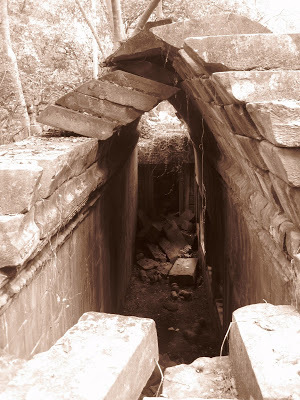
I am somewhere over the Atlantic Ocean, and it is very dark. I am somewhat delusional. I am passing through time relative to three points: where I started, where I am, and where I will be. Ecuador, somewhere in the mid-Atlantic, and Europe. Not the best thing to dwell on in mid-flight.
So what is it, this fabric we call Time? I can perceive time as through a tunnel, linear and directional. It can be slowed to a pace that is manageable, despite the velocity observed by others. I can be frozen in Time, as a fly trapped in amber. And, as I know from experience, I can step outside of time, watching it flow past me. I don't have any real answers, of course. I'm not Albert Einstein. I'm not Raymond Carver, either. I suspect that time is something akin to Cosmic Silly Putty. It can be stretched, rolled, twisted, and can probably lift ghostly images from the grainy four-color printed pictures in the Sunday funnies.
Do you have a story about experiencing altered time? I'd love to hear it. In the meantime, I will continue to slide back and forth along the continuum. Or spiral. Or whatever. Tick-tock, tick-tock.
Ed. note:
Marco is safely back in Vienna, where he should be working on the draft of his third novel, rather than on silly blog posts. He remains delusional, but that has nothing to to with time. Oh, in case you were wondering, the docs have given him both gastrointestinal antibiotics and antibiotic eye-drops. It is assumed that he will recover from all save the aforementioned delusion issues. Marco loves comments. If you so desire, you can leave one below. We, and he, thank you for your understanding.
Published on March 12, 2018 06:27
March 10, 2018
Someone Else's Blues
Disclaimer:
Attention readers who are squeamish about the grittiness of bodily functions, or human suffering in general. This might be a good point to surf the social media for cute kittens videos. Those of you with a well defined sense of schadenfreude, however, will enjoy what follows. You know who you are, you heartless heathens.
Prologue:
This blog post has a sound track, or at least it should. The sound track is "Someone Else's Blues" by David Bromberg. The song goes like this:
When I woke up this morning, everything seemed all right.
My woman called me from New York City. She said, "Darlin', did you sleep well last night?"
She told me I got three checks in the mail. Hallelujah! I got a refund on my union dues.
But when I woke up this morning, I musta had someone else's blues.
I swear I don't know why. I don't know why I feel this way.
Well, I got, I got someone else's blues in the midst of an almost perfect day.
Here is a link to the song itself. If you wish, you can play it in the background whilst you read.
Play "Someone Else's Blues" Baby!
Dateline Guayaquil, Ecuador: When last we saw our intrepid traveler, he was curling up for a night of tropical slumber. And we, good souls, we let him sleep in a cocoon of ignorant bliss. This, however, is a bright new day, a travel day, and a day when the travel gods will demand their payment. Poor sod, he doesn't know what is about to hit him. Ah well, let us wake him.

I slept well that night, basking in the tropical heat. The air was thick and chewy after two weeks of breathing the thin stuff up in the Andes. There was one brekkie on offer with the price of the room, the standard American Breakfast. Two eggs scrambled to death, double toast, coffee and juice. Señor Hansen joined me about the time I was cleaning up the last of the toast. He needed to push on for the south, so he would be dropping me at the airport well ahead of the two-hour international minimum. It would be goodbye Guayaquil after a quick trip to the room. All I needed now was the normal morning call to nature and grabbing up the bag. Being a very regular sort of gent, I was a bit bemused that I managed to only one of the two tasks, grabbing the bag but leaving nothing behind. No matter, another coffee at the airport would set me right. Lots of time yet.
As an aside, Guayaquil is the setting, in part, for one of Kurt Vonnegut's novels, "Galapagos." It is a story of absurdism and Darwinism taken to an extreme end. But anyway, HiHo, off we must go.
We cursed and dodged through the crazed traffic on the Avenida de las Americas. Once you completely disregard the validity of lines and lanes, traffic rules devolve into a shoving match between larger and smaller vehicles. Ours was larger, and Señor Hansen could create curses the locals were no match for. We arrived at the the airport, we unloaded my gear, we parted, and left I was to my own devices. Adios my boon companion!

Now it's Bing-Bang-Boom by the numbers. Check in and drop the bag. Easy, I'm early, the line is short. The bag is gone until Madrid, where I have to pick it up, go through customs, and re-check it for Brussels. Or maybe not. Still way too early for passing security, time for a smoke above the teeming schools of Koi. Life is good. I'm sort of hoping that the cigar jiggles something loose down below, but my guts feel okay. Besides, I have a stop in Bogota. I can use the can there.
I make for the customs line, which looks short and sweet. I draw a cute customs agent, do my best smiley-face, super formal Espanol, clickty-click. More clickty-click. Finally I have my stamp and it's on through security. There is my gate and there is a coffee stand. It's time for an espresso and the bodily magic that will surely bring. I settle in and wait to place my order.
Scrttch-Passenger-Squeak-Ridge to-squawk-number-eeekWait, was that my name? Naw. Squeak-Passenger-Ether-squawk-to gate-eeek-elevenThat's weird. I can understand the Spanish version a lot better. They're calling some passenger with a name close to mine.Realization: when denial fails. I never get called to the gate for something good. I am not on anyone's upgrade list. I know I am not going to get my coffee. And that comfortable airport toilet? Forget it.
"Yes, I'm passenger Etheridge.""Random bag check Sir, please go with this gentlemen."
This ain't my first rodeo and this ain't no random bag check. I've got 150 cigars in my bag, perfectly legal for entering Schengen, and legal for leaving Nicaragua where I got the damn things. Hell, they are even legal for leaving Ecuador. The problem is the tiny detail that only 25 cigars are allowed into Ecuador, a detail I turned a blind eye to flying in from Panama City.
I am deposited at the stainless steel counter. I eyeball the other unlucky winners. A couple of Gringos getting the check already. My turn comes, but the matron waves me to wait. I question why. Special police, we are waiting on the special police. There were already three kinds of cops in the room, but I am in no position to argue. I wait. And I wait. And the clock is running. I use the imploring eyes. The matron is unimpressed. I wait. Finally, my guys show up. In the yellow shirts. Hello old friends.
It is my old pals, the Narcos. I get it now, the baggage X-rays picked up the bundles of cigars. My meticulously packed Deuter 40 is about to be emptied. And it was, slowly, slowly. We are doing a search, and we are making a point. I only protested when the Narco squeezed one of my precious cigar bundles. I managed to do all of it in Spanish except the word 'Squeeze.' I swear, the stern bastard almost cracked a smile. When all of my gear was in a jumble on the big stainless table, he uttered one word, his entire half of the conversation: "Finished." There was nothing left to do but mutter under my breath, very very softly, and re-pack my shit. Weird hurdle cleared, up the creepy stairs and back to the gate.
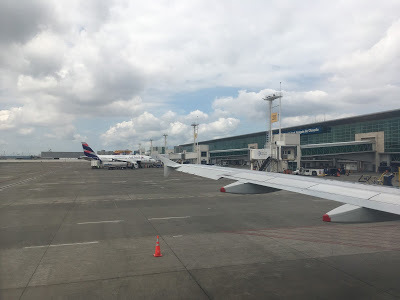
I am in my window seat, all is well. Hell, it's not even raining. As I settle in, I notice my left eye feels sort of funny. It seems to be sore and swollen on the upper eyelid. Hmmm. I must have slept on it wrong. Denial. A tiny voice flits through the darkness of my brain. Do you remember the Gringo talk about an epidemic of conjunctivitis in Guayaquil? Oh hell no, I do not remember that, and I do not have the damn Pink-Eye! Denial. I'm fine. There is nothing wrong with me that can't be fixed by an espresso and a trip to the crapper. And we are airborne.
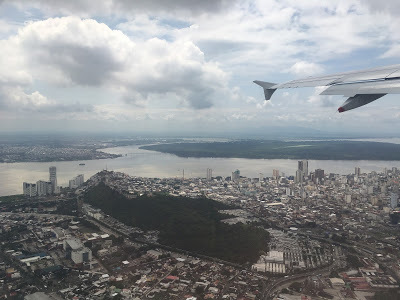
Guayaquil is a sight from the air, a tangle of estuaries, marshes, huge rivers and tidal flats. Wherever there is not water or march, there is city. And so the twenty-some hour marathon of air travel really begins. Guayaquil to Bogota, Bogota to Madrid. A six-hour layover in Madrid followed by a short hop to Brussels and a quick turn-around to Vienna.
Nothing to see below the clouds, none of the cool Ecuadorian volcanoes, so it's time to Zone Out. Movies. Avianca is a pretty cool airline for movies. Dead Pool? Bingo. If I don't finish it by Bogota, I can always watch it on the way to Madrid. I'm not feeling all that great, but that's got to be due to the stress of the bag search, right? And will you top messing with your eye? It's fine, leave it alone.
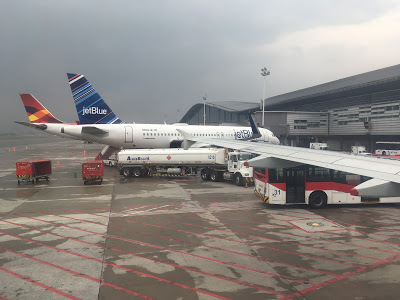
Bogota, Colombia. I have a fairly short layover for an international connection, but there is no customs, no security, no immigration control. I am in that wonderland of neutrality, the secure international terminal of a major airport. Coffee, now. Then the necessary, then the eight hours to Madrid. I get the coffee, spending my last three worn dollar coins. Ecuador uses the US Dollar as it's currency, same as Panama. All of the old Sacagawea dollar coins that no one would use in the US, they went to Ecuador. I have my steaming hot Americano, I get it down, I find a stall in the immense facilities and... nothing. Wait, this is not fair! I drink the coffee, my body is supposed to react like clockwork. That is just how I am. But it's no good. Pausing at the mirror, I see that no amount of denial is going to shrink my left eyelid back to its normal size. It is starting to look a little funny. And not haha funny. No shit right? Sorry, I meant that literally.
So, okay, I may have to do that most dreaded travel deed: crap on the plane. It wouldn't be the first time. I have seen some very bizarre things that pass for toilets, so a plane is not big deal. But I'm not feeling so hot, therefore I am not pleased at the idea. Whatever, get on the plane, get settled.
Eight-point-five hours across the pond. That's cake. Four movies and two meals or three movies, two meals, and a nap. I settle into "Dead Pool" again, from the beginning, because I've got nothing but time. The meal comes and goes, whatever, and then I go for "Hail Caesar." Do you know why "Dead Pool" and "Hail Caesar" make a great double feature? Because the bad guy in "Dead Pool" is named Francis. Frances McDormand has a bit part in "Hail Caesar." Francis and Frances, get it? What? No it's not lame.
So it goes. My eye is getting worse and my guts are locked up like mortared bricks. I have an aisle seat, the plane is basically asleep, and I'm starting to cramp up. Right, the vacant light is on. But despite my best efforts in that tiny high-altitude crapper, my vacant light ain't coming on. Whatever, there's Madrid, a long layover, nothing but time.
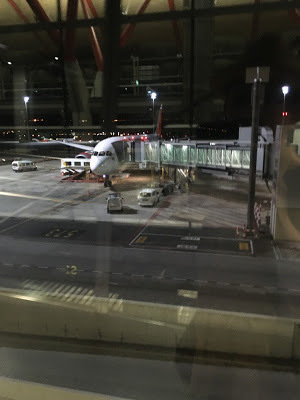
Madrid. Big deal, another airport. But at least I am back in Europe and the long flight is over. Now it's a six-hour layover. Cigar, crap, sleep. But first I have to get my bag and clear immigration. The Spanish guys are on it, super polite, check my passport and title card, welcome back. Baggage is not too bad, because my bag is there. Yay! I get a water and shuffle out into the chill of a dark Madrid morning. I am pulling my jacket out of the top of my pack when I notice that things are not right. Someone has been in my bag. No, someone has emptied my bag and repacked it. Badly. The Narcos in Bogota have done another search. Don't these guys talk? Now I'm pissed. I'm cold, my eye hurts, and my guts feel like lead. But I have to pack my bag properly so the goddam cigars will survive the next set of baggage monkeys.
Re-packed, jacketed, with a good cigar going, I give myself a talking to. You are better than this, my friend, and you have gotten through far worse than this. Calm down, enjoy your smoke, and then we can mosey over to terminal two and have a nap. The problem was that myself wasn't having any of it. What if we have conjunctivitis? Do you know how contagious that is? What if they quarantine our sorry ass? And what about the rebellion below decks? It's an intestinal mutiny down there! So it goes, HiHo. Not my best cigar ever.

The bus ride from the Madrid International terminal (4) to domestic (2) seems to be about ten kilometers long. Maybe it is. From the outside, terminal two is about as ratty as it gets, old and outdated, with construction underway. Inside, well, it's not much better this side of security. I was stuck in construction land until Brussels Airways opened up check-in at their temporary baggage drop. I slumped on the the cold tile floor, did my best to imagine myself a displaced person, and tried to sleep. This part is sort of a blur. I was starting to feel a bit feverish, my eye hurt, and my guts were starting to cramp. Eventually, the Brussels folks opened for business. Given that I had a short forty-minute change in Brussels, they hot-tagged my bag. Sure, that little orange tag will do it. Whatever, I'm inbound. I can't take a shit and I don't give a shit.
The rest of the flights really are a blur. They were a blur at the time. Nodding, taking off, nodding, landing, a fast bus ride to a connecting flight, the blessed last flight. More nodding, then snapping awake, then final approach into Vienna. I was in zombie mode, but I was in Wien. My bag of course, was not. I filed a claim at baggage. Yes, my bag was still in Brussels. Yes, there was another flight tonight and I would get the bag no later than noon the next day. Fine, whatever, thank you. Then it was out the exit and into My Baby's arms. She guided me onto the train and we were whisking out way home. All was well, it was over. I was able to enjoy and blissful and passionate homecoming, followed by an unceremonious passing out. Mission accomplished, yes?

Well, I ain't that pretty at all...
No. That would be the answer. Before she headed off to work the next day, My Beautiful wife found a local eye doctor. She insisted that I go. I did not need convincing. I was looking like the Elephant Man except without his mask and hat. Without appointment I show up at the Doc. They take one look at me and promptly work me in. Good news, no conjunctivitis. Bad news, a pretty nasty eye infection, cause unknown. I got my script for eye drops, got it filled, and headed for home. But my bag did show up. One look at me was enough to scare the hell out of the delivery guy. But what did I care? I had my stuff. But the real-deal bad news was on the way.
My recalcitrant guts now decided to go into overdrive. While I have rarely experienced the delights of an iron-bound intestinal tract, I am all too familiar with the trials of bowels laid waste by this or that microbe. When it happens, the hows and whys of it fall by the wayside, right nest to the toilet brush. The game was on in a big way.
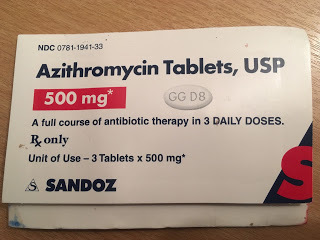
Sandoz Azithromycin 500 mg. When you absolutely, positively, have to kill every nasty microbe in your gut, accept no substitute. Sandoz also made great LSD, back in the day. Just saying.
This, then, was what the last four days have been. When you are certain that not one more speck of anything could possible come out of the human body, the human body will prove you wrong. Over and over and over again. Solid food is a chore, and one taken in only very small doses. Dehydration is a real issues, most particularly when any liquid is coming out as fast as it goes in. There is one small benefit. That little pudge I was building around the middle, the month of rice and beans and meat? That sucker is gone, way gone. I am now thin as a pony rail.
It is 2:51 in the AM on a Sunday morning in Wien. My guts are as calm as they have been in a week. Hallelujah. Being awake at this hour is just simple jet-lag and the desire to write this down before the edge of suffering vanishes completely. I need to get my beauty rest because, well, you saw the picture. My eyes are actually healing faster than the rest of me, and I'm weak as a kitten, but HiHo, so it goes.
This is what it is like sometimes. I can't lie to you. Travel, occasionally, sucks serious ass. This was one of those times. Do I regret going on this trip? Hell no! Would I do it again? Hell yes! Would I want it to be easier? Oh yes please, very much so. Mostly, I am incredibly lucky. I get away with wacky shit all the time. This time, well, I had to pay the price. Is this going to give me second thoughts about the next trip? No it will not. I'll be fine.
Next week, Wednesday, My Baby and I are climbing on a flight to southern Spain. We're staying with friends, at a their little house out on the campo. Sounds nice, right? You bet. So, travel well, travel often, heal quickly when you have to heal, and Ciao for Now!
Attention readers who are squeamish about the grittiness of bodily functions, or human suffering in general. This might be a good point to surf the social media for cute kittens videos. Those of you with a well defined sense of schadenfreude, however, will enjoy what follows. You know who you are, you heartless heathens.
Prologue:
This blog post has a sound track, or at least it should. The sound track is "Someone Else's Blues" by David Bromberg. The song goes like this:
When I woke up this morning, everything seemed all right.
My woman called me from New York City. She said, "Darlin', did you sleep well last night?"
She told me I got three checks in the mail. Hallelujah! I got a refund on my union dues.
But when I woke up this morning, I musta had someone else's blues.
I swear I don't know why. I don't know why I feel this way.
Well, I got, I got someone else's blues in the midst of an almost perfect day.
Here is a link to the song itself. If you wish, you can play it in the background whilst you read.
Play "Someone Else's Blues" Baby!
Dateline Guayaquil, Ecuador: When last we saw our intrepid traveler, he was curling up for a night of tropical slumber. And we, good souls, we let him sleep in a cocoon of ignorant bliss. This, however, is a bright new day, a travel day, and a day when the travel gods will demand their payment. Poor sod, he doesn't know what is about to hit him. Ah well, let us wake him.

I slept well that night, basking in the tropical heat. The air was thick and chewy after two weeks of breathing the thin stuff up in the Andes. There was one brekkie on offer with the price of the room, the standard American Breakfast. Two eggs scrambled to death, double toast, coffee and juice. Señor Hansen joined me about the time I was cleaning up the last of the toast. He needed to push on for the south, so he would be dropping me at the airport well ahead of the two-hour international minimum. It would be goodbye Guayaquil after a quick trip to the room. All I needed now was the normal morning call to nature and grabbing up the bag. Being a very regular sort of gent, I was a bit bemused that I managed to only one of the two tasks, grabbing the bag but leaving nothing behind. No matter, another coffee at the airport would set me right. Lots of time yet.
As an aside, Guayaquil is the setting, in part, for one of Kurt Vonnegut's novels, "Galapagos." It is a story of absurdism and Darwinism taken to an extreme end. But anyway, HiHo, off we must go.
We cursed and dodged through the crazed traffic on the Avenida de las Americas. Once you completely disregard the validity of lines and lanes, traffic rules devolve into a shoving match between larger and smaller vehicles. Ours was larger, and Señor Hansen could create curses the locals were no match for. We arrived at the the airport, we unloaded my gear, we parted, and left I was to my own devices. Adios my boon companion!

Now it's Bing-Bang-Boom by the numbers. Check in and drop the bag. Easy, I'm early, the line is short. The bag is gone until Madrid, where I have to pick it up, go through customs, and re-check it for Brussels. Or maybe not. Still way too early for passing security, time for a smoke above the teeming schools of Koi. Life is good. I'm sort of hoping that the cigar jiggles something loose down below, but my guts feel okay. Besides, I have a stop in Bogota. I can use the can there.
I make for the customs line, which looks short and sweet. I draw a cute customs agent, do my best smiley-face, super formal Espanol, clickty-click. More clickty-click. Finally I have my stamp and it's on through security. There is my gate and there is a coffee stand. It's time for an espresso and the bodily magic that will surely bring. I settle in and wait to place my order.
Scrttch-Passenger-Squeak-Ridge to-squawk-number-eeekWait, was that my name? Naw. Squeak-Passenger-Ether-squawk-to gate-eeek-elevenThat's weird. I can understand the Spanish version a lot better. They're calling some passenger with a name close to mine.Realization: when denial fails. I never get called to the gate for something good. I am not on anyone's upgrade list. I know I am not going to get my coffee. And that comfortable airport toilet? Forget it.
"Yes, I'm passenger Etheridge.""Random bag check Sir, please go with this gentlemen."
This ain't my first rodeo and this ain't no random bag check. I've got 150 cigars in my bag, perfectly legal for entering Schengen, and legal for leaving Nicaragua where I got the damn things. Hell, they are even legal for leaving Ecuador. The problem is the tiny detail that only 25 cigars are allowed into Ecuador, a detail I turned a blind eye to flying in from Panama City.
I am deposited at the stainless steel counter. I eyeball the other unlucky winners. A couple of Gringos getting the check already. My turn comes, but the matron waves me to wait. I question why. Special police, we are waiting on the special police. There were already three kinds of cops in the room, but I am in no position to argue. I wait. And I wait. And the clock is running. I use the imploring eyes. The matron is unimpressed. I wait. Finally, my guys show up. In the yellow shirts. Hello old friends.
It is my old pals, the Narcos. I get it now, the baggage X-rays picked up the bundles of cigars. My meticulously packed Deuter 40 is about to be emptied. And it was, slowly, slowly. We are doing a search, and we are making a point. I only protested when the Narco squeezed one of my precious cigar bundles. I managed to do all of it in Spanish except the word 'Squeeze.' I swear, the stern bastard almost cracked a smile. When all of my gear was in a jumble on the big stainless table, he uttered one word, his entire half of the conversation: "Finished." There was nothing left to do but mutter under my breath, very very softly, and re-pack my shit. Weird hurdle cleared, up the creepy stairs and back to the gate.

I am in my window seat, all is well. Hell, it's not even raining. As I settle in, I notice my left eye feels sort of funny. It seems to be sore and swollen on the upper eyelid. Hmmm. I must have slept on it wrong. Denial. A tiny voice flits through the darkness of my brain. Do you remember the Gringo talk about an epidemic of conjunctivitis in Guayaquil? Oh hell no, I do not remember that, and I do not have the damn Pink-Eye! Denial. I'm fine. There is nothing wrong with me that can't be fixed by an espresso and a trip to the crapper. And we are airborne.

Guayaquil is a sight from the air, a tangle of estuaries, marshes, huge rivers and tidal flats. Wherever there is not water or march, there is city. And so the twenty-some hour marathon of air travel really begins. Guayaquil to Bogota, Bogota to Madrid. A six-hour layover in Madrid followed by a short hop to Brussels and a quick turn-around to Vienna.
Nothing to see below the clouds, none of the cool Ecuadorian volcanoes, so it's time to Zone Out. Movies. Avianca is a pretty cool airline for movies. Dead Pool? Bingo. If I don't finish it by Bogota, I can always watch it on the way to Madrid. I'm not feeling all that great, but that's got to be due to the stress of the bag search, right? And will you top messing with your eye? It's fine, leave it alone.

Bogota, Colombia. I have a fairly short layover for an international connection, but there is no customs, no security, no immigration control. I am in that wonderland of neutrality, the secure international terminal of a major airport. Coffee, now. Then the necessary, then the eight hours to Madrid. I get the coffee, spending my last three worn dollar coins. Ecuador uses the US Dollar as it's currency, same as Panama. All of the old Sacagawea dollar coins that no one would use in the US, they went to Ecuador. I have my steaming hot Americano, I get it down, I find a stall in the immense facilities and... nothing. Wait, this is not fair! I drink the coffee, my body is supposed to react like clockwork. That is just how I am. But it's no good. Pausing at the mirror, I see that no amount of denial is going to shrink my left eyelid back to its normal size. It is starting to look a little funny. And not haha funny. No shit right? Sorry, I meant that literally.
So, okay, I may have to do that most dreaded travel deed: crap on the plane. It wouldn't be the first time. I have seen some very bizarre things that pass for toilets, so a plane is not big deal. But I'm not feeling so hot, therefore I am not pleased at the idea. Whatever, get on the plane, get settled.
Eight-point-five hours across the pond. That's cake. Four movies and two meals or three movies, two meals, and a nap. I settle into "Dead Pool" again, from the beginning, because I've got nothing but time. The meal comes and goes, whatever, and then I go for "Hail Caesar." Do you know why "Dead Pool" and "Hail Caesar" make a great double feature? Because the bad guy in "Dead Pool" is named Francis. Frances McDormand has a bit part in "Hail Caesar." Francis and Frances, get it? What? No it's not lame.
So it goes. My eye is getting worse and my guts are locked up like mortared bricks. I have an aisle seat, the plane is basically asleep, and I'm starting to cramp up. Right, the vacant light is on. But despite my best efforts in that tiny high-altitude crapper, my vacant light ain't coming on. Whatever, there's Madrid, a long layover, nothing but time.

Madrid. Big deal, another airport. But at least I am back in Europe and the long flight is over. Now it's a six-hour layover. Cigar, crap, sleep. But first I have to get my bag and clear immigration. The Spanish guys are on it, super polite, check my passport and title card, welcome back. Baggage is not too bad, because my bag is there. Yay! I get a water and shuffle out into the chill of a dark Madrid morning. I am pulling my jacket out of the top of my pack when I notice that things are not right. Someone has been in my bag. No, someone has emptied my bag and repacked it. Badly. The Narcos in Bogota have done another search. Don't these guys talk? Now I'm pissed. I'm cold, my eye hurts, and my guts feel like lead. But I have to pack my bag properly so the goddam cigars will survive the next set of baggage monkeys.
Re-packed, jacketed, with a good cigar going, I give myself a talking to. You are better than this, my friend, and you have gotten through far worse than this. Calm down, enjoy your smoke, and then we can mosey over to terminal two and have a nap. The problem was that myself wasn't having any of it. What if we have conjunctivitis? Do you know how contagious that is? What if they quarantine our sorry ass? And what about the rebellion below decks? It's an intestinal mutiny down there! So it goes, HiHo. Not my best cigar ever.

The bus ride from the Madrid International terminal (4) to domestic (2) seems to be about ten kilometers long. Maybe it is. From the outside, terminal two is about as ratty as it gets, old and outdated, with construction underway. Inside, well, it's not much better this side of security. I was stuck in construction land until Brussels Airways opened up check-in at their temporary baggage drop. I slumped on the the cold tile floor, did my best to imagine myself a displaced person, and tried to sleep. This part is sort of a blur. I was starting to feel a bit feverish, my eye hurt, and my guts were starting to cramp. Eventually, the Brussels folks opened for business. Given that I had a short forty-minute change in Brussels, they hot-tagged my bag. Sure, that little orange tag will do it. Whatever, I'm inbound. I can't take a shit and I don't give a shit.
The rest of the flights really are a blur. They were a blur at the time. Nodding, taking off, nodding, landing, a fast bus ride to a connecting flight, the blessed last flight. More nodding, then snapping awake, then final approach into Vienna. I was in zombie mode, but I was in Wien. My bag of course, was not. I filed a claim at baggage. Yes, my bag was still in Brussels. Yes, there was another flight tonight and I would get the bag no later than noon the next day. Fine, whatever, thank you. Then it was out the exit and into My Baby's arms. She guided me onto the train and we were whisking out way home. All was well, it was over. I was able to enjoy and blissful and passionate homecoming, followed by an unceremonious passing out. Mission accomplished, yes?

Well, I ain't that pretty at all...
No. That would be the answer. Before she headed off to work the next day, My Beautiful wife found a local eye doctor. She insisted that I go. I did not need convincing. I was looking like the Elephant Man except without his mask and hat. Without appointment I show up at the Doc. They take one look at me and promptly work me in. Good news, no conjunctivitis. Bad news, a pretty nasty eye infection, cause unknown. I got my script for eye drops, got it filled, and headed for home. But my bag did show up. One look at me was enough to scare the hell out of the delivery guy. But what did I care? I had my stuff. But the real-deal bad news was on the way.
My recalcitrant guts now decided to go into overdrive. While I have rarely experienced the delights of an iron-bound intestinal tract, I am all too familiar with the trials of bowels laid waste by this or that microbe. When it happens, the hows and whys of it fall by the wayside, right nest to the toilet brush. The game was on in a big way.

Sandoz Azithromycin 500 mg. When you absolutely, positively, have to kill every nasty microbe in your gut, accept no substitute. Sandoz also made great LSD, back in the day. Just saying.
This, then, was what the last four days have been. When you are certain that not one more speck of anything could possible come out of the human body, the human body will prove you wrong. Over and over and over again. Solid food is a chore, and one taken in only very small doses. Dehydration is a real issues, most particularly when any liquid is coming out as fast as it goes in. There is one small benefit. That little pudge I was building around the middle, the month of rice and beans and meat? That sucker is gone, way gone. I am now thin as a pony rail.
It is 2:51 in the AM on a Sunday morning in Wien. My guts are as calm as they have been in a week. Hallelujah. Being awake at this hour is just simple jet-lag and the desire to write this down before the edge of suffering vanishes completely. I need to get my beauty rest because, well, you saw the picture. My eyes are actually healing faster than the rest of me, and I'm weak as a kitten, but HiHo, so it goes.
This is what it is like sometimes. I can't lie to you. Travel, occasionally, sucks serious ass. This was one of those times. Do I regret going on this trip? Hell no! Would I do it again? Hell yes! Would I want it to be easier? Oh yes please, very much so. Mostly, I am incredibly lucky. I get away with wacky shit all the time. This time, well, I had to pay the price. Is this going to give me second thoughts about the next trip? No it will not. I'll be fine.
Next week, Wednesday, My Baby and I are climbing on a flight to southern Spain. We're staying with friends, at a their little house out on the campo. Sounds nice, right? You bet. So, travel well, travel often, heal quickly when you have to heal, and Ciao for Now!
Published on March 10, 2018 18:19
Through a Biotic Haze

First, to the little Biotic Bastids that tried to kill me off: "Nyner-Nyner!! I'm still alive!" Second, to be forthright, the little buggers almost did me in. Through the miracle of the Blog-Time-Warp, I am sitting in Vienna, rediscovering the small wonder of a solid breakfast. The last entry of the blog, however, has me waxing poetic about my penultimate day in Cuenca. Quite a gap, even for a lazy old sod such as myself. Allow me to attempt an explanation.
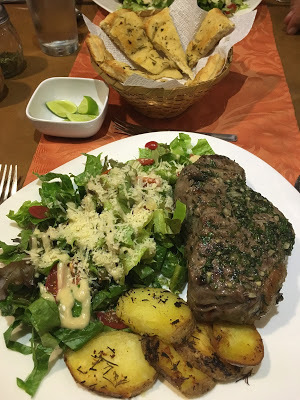
It was the last night in Cuenca. I remember it well. My boon companion Señor Hansen insisted on treating me to a steak dinner, or at least to as close as one can get to a steak dinner in Cuenca. As he put it, "It was a piece of roast cut to look like a steak." The man is a sharp critic; astute, but sharp. I at least enjoyed the dinner. I also enjoyed the cigar afterwards. Except for the knowledge that I would soon be spending some twenty-four hours on a combination of airplanes, I felt pretty damn good. So where did it all go wrong?
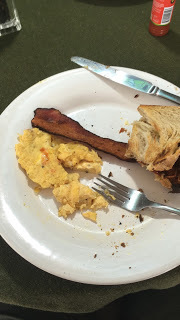
To quote David Bromberg: "When I woke up this morning, everything seemed alright..." It was a jolly morning, a morning of first breakfast, coffee, cigars. We followed that with a lovely second breakfast, including all the bacon any human being should eat. Today we would drive over the Cajas, from Cuenca to Guayaquil, but there was time for one last cigar and the best balcony in South America.
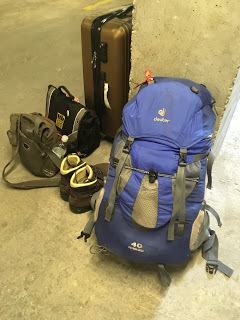
Eventually we had to depart. Bags were loaded and we began the trek to the coast, but not before a fuel stop.
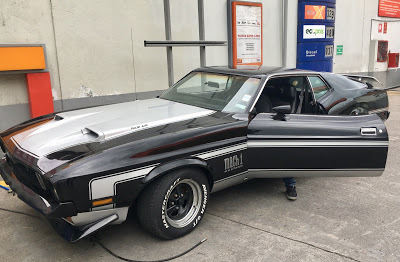
Vintage Detroit Iron, not the most likely sight in Cuenca, Ecuador.
It was your typical Sunday afternoon drive through the Andes. There was the steady steam of cursing at the crazy antics performed by the local drivers. There was, of course, the normal disregard for the idea of lanes and staying in them. Then we had the repeated bracing for impact, along with the gentle unclenching of clenched sphincters. As I said, a typical Sunday drive here in Ecuador.
We saw herds of wild llamas as we approached the pass at Tres Cruces. Rain was falling across the narrow roadway as we began the long drop to the hot flatlands more than 13,000 feet below. Down, down, the road wound down, and with it came added velocity. Everything was normal, everything seemed alright.
In my experience, downhill runs on third-world mountain roads are the devil's workshop. Many of the local vehicles are under-powered, lacking in braking potential, and highly over-loaded. This makes them a cinch to pass on uphill runs. Sure, you curse them for the belching clouds of black smoke, but passing them on a solid double-yellow with a curve approaching on a blind uphill is sort of a kick. Downhill, however, puts gravity and the laws of physics in the favor of the Joad-mobiles. A severely over-loaded freight lorry with no brake lights careening through a dense fog on a twisting mountain road with more than a thousand foot drop to the low side, well now, that crazed truck-jockey, he has him the right-o-way. When you decide to pass one of these maniacs, it is akin to throwing your mortality into the gauzy whiteness of the impenetrable fog ahead of you, hoping that you don't see your own life flying past you on the grill of an oncoming banana truck. What a strange last view of life that would be.
But we survived. Señor Hansen piloted the Hansen-mobile past the ob-stac-les in our path. We were on the flatlands, back amidst the wonderfully moist tropical heat. Cacao, sugar cane, bananas, and mango trees pushed up against the highway. Waves of green upon green, wet, verdant, clusters of chaotic fruit stands pushing up to the edges of the roadway. The locals continued to perform crazy driving antics, veering on and off the highway in search of that perfect pile of mangos, but without the advantage of gravity. We dodged them and continued into the maw of Guayaquil.
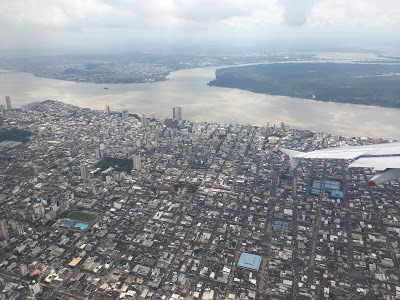
Guayaquil, Ecuador. Water and city, city and water. Straddling a massive tidal plane and river estuary, this is the largest city in Ecuador, and the city with the worst reputation. The Cuenca Ex-pats love to talk about how dangerous the city is. On of them called it "The Somalia of Ecuador," which drew howls of protest from the Guayaquilians reading the same forum. I think she meant the "Mogadishu of Ecuador," but whatever. Anyway, Guayaquil gets a bad rap, complete with tales of thugs on motorcycles robbing folks in open-air cafés. I am skeptical. Señor Hansen is not. Take your pick.
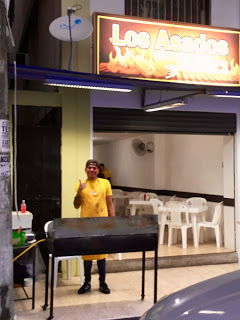
We drove past the airport and checked into our hostal. The air was wonderfully wet, thick, moist and chewy. I was wallowing around in it like a kitten in yarn. Señor Hansen was not quite so thrilled. Following the vague directions of our host, we set out for a stroll to the recommended local eatery. A few twists and turns aside, we arrived at Los Asados, complete with friendly hellos and smiles.
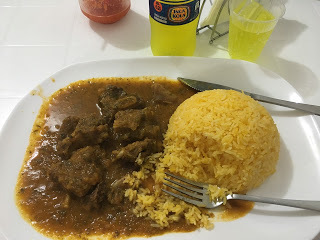
The smiling woman who waited on us rattled off the choices of the day. No, there were no menus. C'mon Gringos, throw down with your bad-ass command of the Espanol. Which I commenced to do. Sort of. In my defense, we did end up getting some food, and it was pretty close to what I thought I was ordering. Everything tasted great, the folks were really nice, and we were proudly presented with business cards with which to remember our dinner.
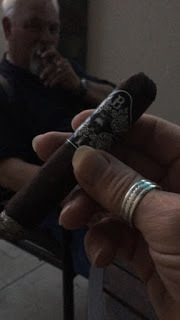 Then there was the walk back through the city streets. No motorcycle banditos assaulted us, but it was a short walk. We enjoyed a quiet cigar on the terrace, awash in the sultry evening heat. It had been a good day, a good travel day, and a good companionship day. Just like the man sang: "Everything seemed alright..." but perhaps the little bug had already been planted. Or perhaps I was tripped up with some event yet to come, some sip of the wrong water of chip of the wrong ice.
Then there was the walk back through the city streets. No motorcycle banditos assaulted us, but it was a short walk. We enjoyed a quiet cigar on the terrace, awash in the sultry evening heat. It had been a good day, a good travel day, and a good companionship day. Just like the man sang: "Everything seemed alright..." but perhaps the little bug had already been planted. Or perhaps I was tripped up with some event yet to come, some sip of the wrong water of chip of the wrong ice. I think it best if we just leave it here for right now. As I slip into my bed in Guayaquil, all is still well. Why bring up the long, slow trek of suffering that is going to begin very soon? Let the poor fool sleep in peace, yes? Maybe the evil biotic buggers are already at work, but who knows? There are several possible clues scattered in the story, little tidbits about this or that consumed. Has it started or not, the invasion? Well Dude, we just don't know.
Published on March 10, 2018 00:29
March 4, 2018
Farewell Cuenca

Chilling on the best balcony in South America.
I am sitting in a hostel room in Guayaquil, Ecuador. The air-con is running for the moment, taking some of the sultriness out of the thick air. It is warm, wet, and wonderful. After two weeks of breathing the rarified air at 8,300 feet above sea-level, the thick, moist air feels like a rich dessert. This is my last night in Ecuador. Tomorrow I fly from Guayquil to Bogota, Colombia, and from there to Madrid. From Madrid it is a Euro hop to Brussels, and then back to my home in Vienna and My Beloved in Vienna. Yes, it is time to once more pay the piper, rendering unto the travel gods that which is theirs.
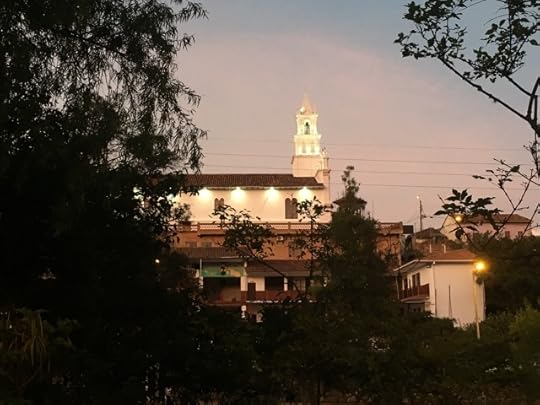
Cuenca is an odd place, and one of my home places in this wide world. In Cuenca I have my own room, courtesy of a great Hermano. I can roam at will, walking this most walkable of cities, and then retire to companionship and camaraderie on a balcony overlooking the Rio Tomebamba. Life here is good.
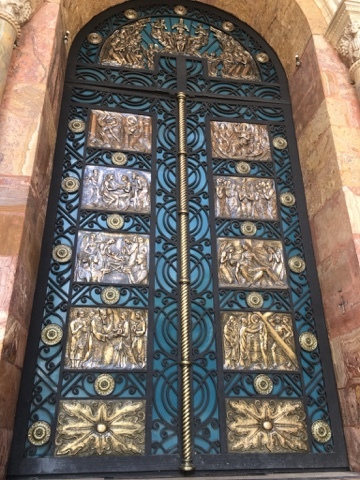
Cuenca is many things. It is a historic place, a UNESCO World Heritage Site, and home to a vibrant ex-pat community. The ex-pats have what seems like a small village, albeit scattered amidst a larger city. This village is not unlike other small communities, complete with support for its memebers and a thourough knowledge of all of the village gossip. Cuenca is also a great town for doors. Some cities are, some are not. Lisboa, Portugal, is one of the great door towns of the world. So is Quito. I now have to rank Cuenca in that illustrious company.
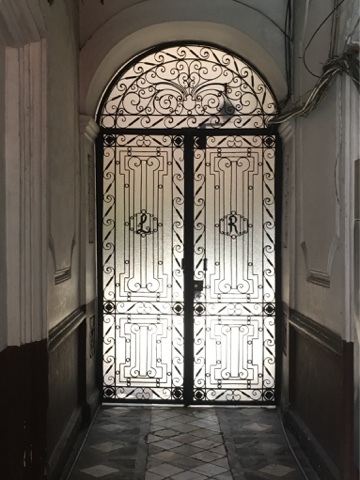
While Ecuadorian food is not likely to cause foodies to swoon, the Mercado does supply an amazing variety of my favorite fruits and vegetables. Not only can one see to shopping needs, there is a dazzling array of food stalls to chose from. With any luck, a hungry shopper can share a small table with an ancient Otovalo couple who are amused by every single thing that one does. Such was one of my dining experiences. When I finished my entire plate of food, they assumed that I must still be hungry and offered me some of their food.
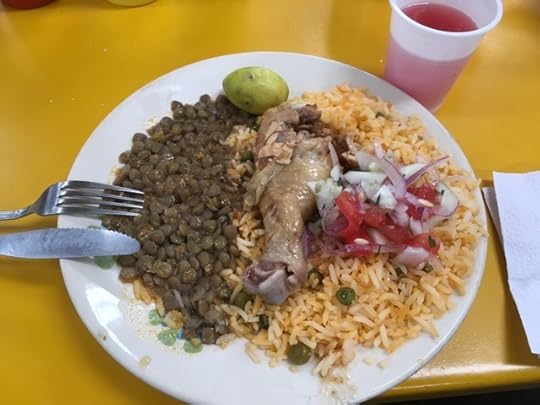
A typical Ecuadorain meal. Lentils, pollo, and rice.
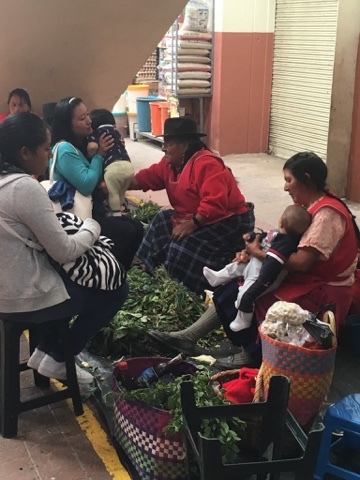
If you are needing a spiritual tune-up, a cadre of Shaman women are standing by to beat you with a bunch of herbs and flowers, roll a raw egg over your body to suck out the bad things, and then aerosol you with an alcohol concoction that they spray out of their mouths. All-in-all, a most invigorating experience.

Papaya still-life, and one of the things I will miss the most.
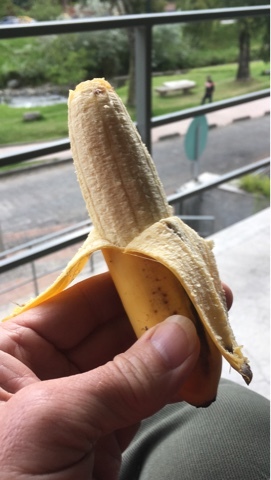
Possibly the best bananas in the world from one of the best balconies in the world.
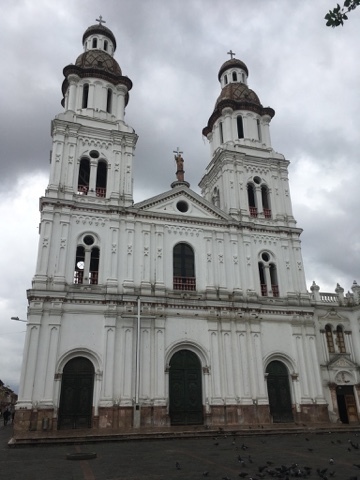
Churches and clouds, Cuenca has both in abundance.
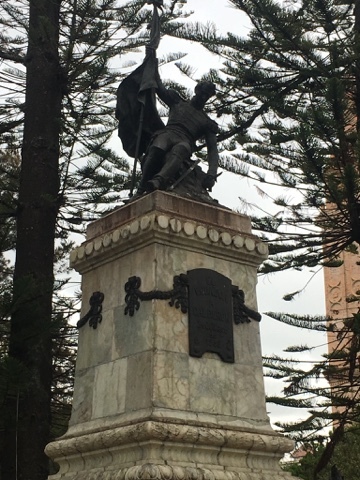
Dead guys, check. Cuenca has more than its share of bronze dead guys. Many of them died in a fervor of patriotism, or at least that is what we are led to believe. In the 1800's, there were plenty of chances for a good patriot to shed blood for honor and country, particularly in the many battles with neighboring Peru.
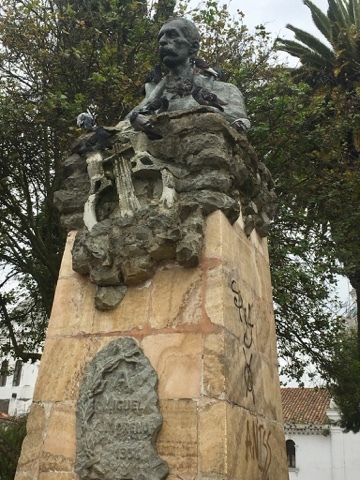
There are even statues to dead poets. This is one, a bust of Miguel Moreno, native Cuencan poet. One does not find these things by driving. Cuenca is a terrible town for driving. In the historic district, the narrow streets are often choked with traffic jams. Walking the city, however, is a joy.
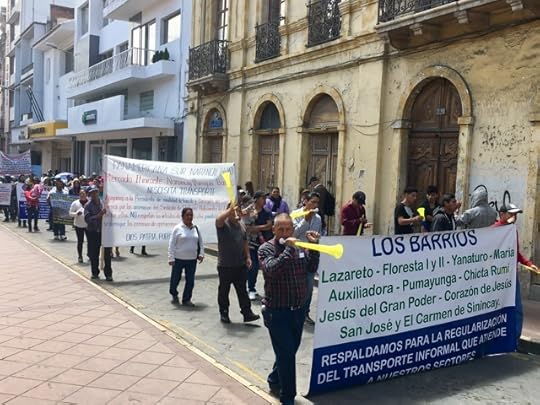
A small street demonstration, all too common in this hands-on democracy, can snarl traffic in the old city to a standstill. On this day, folks in the outlying barrios were demanding better access to transportation.
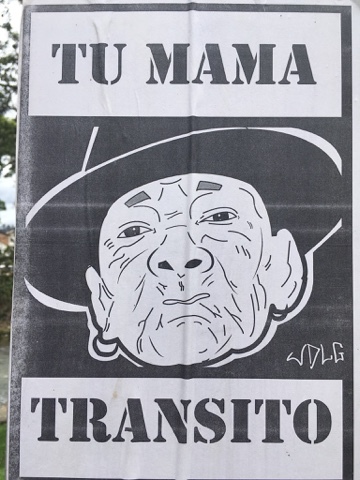
Speaking of traffic, almost everyone dislikes the Transitos, the traffic cops. Hence the graffiti "Your Mama is a Traffic Cop."
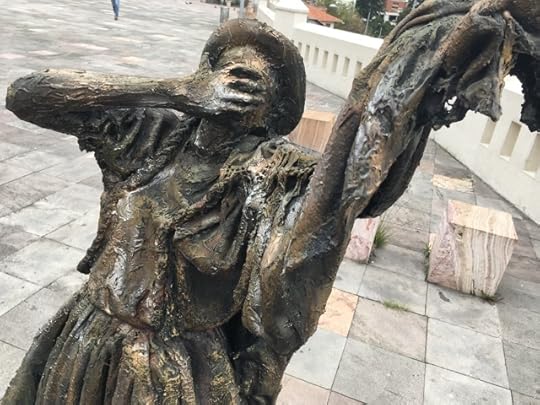
Street sculpture, Cuenca.
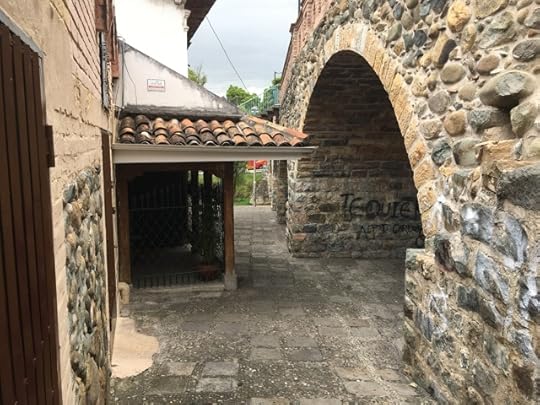
Under the Broken Bridge.
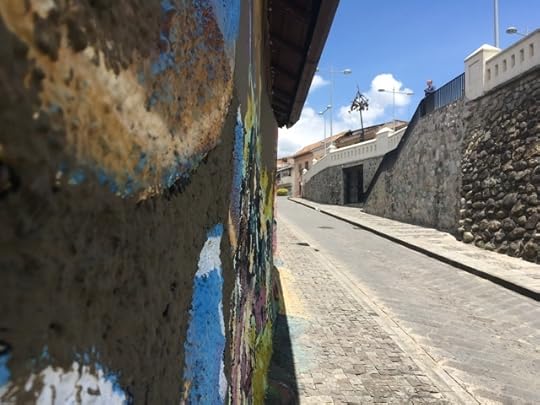
Random view, Cuenca walkabout.
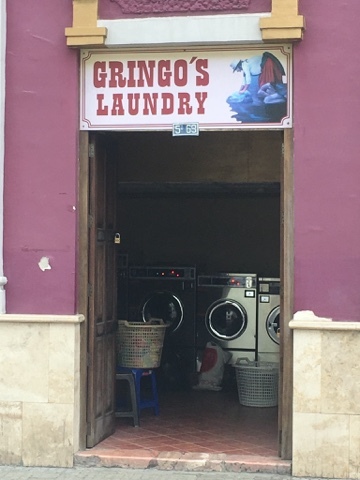
If you have a Dirty Gringo, you can drop him or her off here and come back in four hours. They will be squeaky clean when you pick them up.
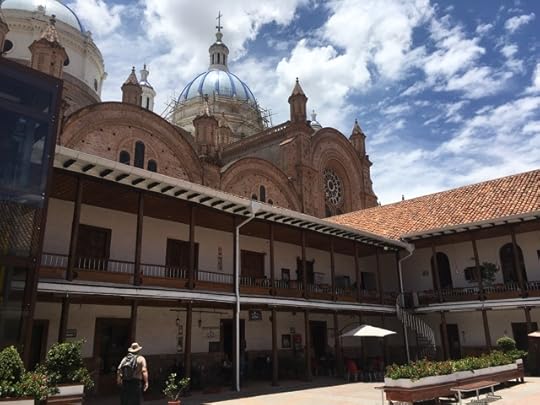
The historic center is composed of block buildings that rise up from the sidewalk. This creates canyons of narrow cobbled streets and stone walls. But, venture inside one of the open doorways, and one will find hidden courtyards, the secret inner life behind the stone walls.
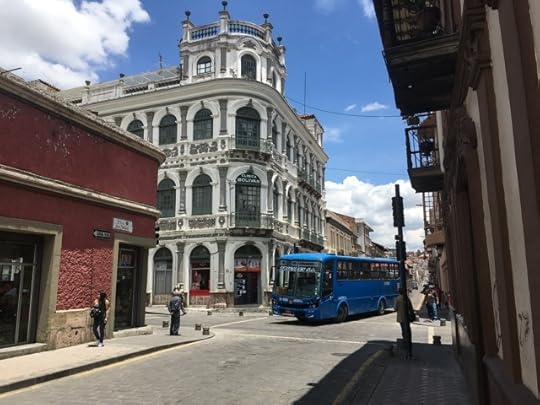
One of the smoke-belching diesel buses careening through a typical street in the historic district.
Cuenca is mixed bag. It takes time to adjust to the thin air. It takes time to adjust to the juxtaposition of a modern South American city with a centuries-old historic center. There is the Cuenca of Belgian block streets, and the modern concrete-paved streets of trendy bars and cafes. Old and new blend together. The folks on the street are just as diverse. There are modern Ecuadorians, indigenous men and women wearing their felt fedoras, and the Gringo ex-pats with their ubiquitous Panama hats. As a side note, 'Panama' hats, as we call them, are made in Ecuador. The round straw hats make in Panama are a completely different style of headwear.
It is a great walking city and a terrible driving city. The thin air will make it difficult to sleep, at least until one acclimatizes. It is hard to get a good steak here, but the papayas will cause one to swoon. Cuenca is diffcult to get to. Once you are here, it is diffcult to leave, but not because of transportation issues.
Tonight I am in Guayaquil, but there is more to the tale. It will have to wait until the next post. There will be the journey from the Andes down to the sultry coast, the paying of the Piper, the reunion with My Beloved. But this is the stuff of tomorrow. For tonight, from Guayaquil, Ecuador, travel well, travel often, and Ciao for Now!
Published on March 04, 2018 18:32



